Yi Jing Hexagram 3 - Line 2
The hexagram: 3
An hexagram is a combination of six yin and yang lines.

3.2 (3 > 60) - THE KUN HEXAGRAM
The second line, divided, shows (its subject) distressed and obliged to return; (even) the horses of her chariot (also) seem to be retreating. (But) not by a spoiler (is she assailed), but by one who seeks her to be his wife. The young lady maintains her firm correctness, and declines a union. After ten years she will be united, and have children.
Bing DeepL Google Yandex3.2 (3 > 60) - Resolving difficulties
One must establish a trusting relationship before others accept.
Bing DeepL Google Yandex3.2 (3 > 60) - Resolving difficulties
One must establish a relationship of trust before others accept.
Bing DeepL Google Yandex3.2 (3 > 60) - T’un, la difficulté initiale
T’un et tchun : A. 1. Bourgeon, pousse ; 2. Croissance, activité ; 3. Grandir, avancer. — B. Difficultés, arrêté dans son avancement, échec.
2a. Tchun est comme arrêté par les difficultés, comme un cavalier dont le cheval veut reculer (ou : un cheval monté qui veut...).
2b. C’est comme la jeune fille qui veut épouser un brigand ravisseur, elle doit rester inébranlable et attendre (plutôt) dix ans. (Malgré cela), elle pourra alors se marier et être mère. (Il est ici question de difficultés.)
Un équipage solide, l’enfantement après dix ans indique le retour à la prospérité, à l’avancement.
3.2 (3 > 60) - Remédier aux difficultés
On doit établir une relation de confiance avant que les autres n'acceptent.
Bing DeepL Google Yandex3.2 (3 > 60) - Megoldás
Megbízható kapcsolatokat kell kialakítania mielőtt mások elfogadnák.
Bing DeepL Google YandexThe trigrams
The trigrams are combinations of three yin and yang lines. The three bottom lines of the hexagram form the lower trigram and represent the inner situation. The three top lines form the upper trigram and represent the outer situation.
trigSup

Lower trigram: The thunder The lake


The nuclear hexagram: 23.1 (23 > 27)
The nuclear hexagram is the association of the two inner trigrams (lines 2,3,4 and 3,4,5). It represents the root, or the origin of the situation.

23.1 (23 > 27) - THE PO HEXAGRAM
The first line, divided, shows one overturning the couch by injuring its legs. (The injury will go on to) the destruction of (all) firm correctness, and there will be evil.
Bing DeepL Google Yandex23.1 (23 > 27) - Burying one's head in the sand
One does not see what one loses.
Bing DeepL Google Yandex23.1 (23 > 27) - Burying one's head in the sand
One does not see what one loses.
Bing DeepL Google Yandex23.1 (23 > 27) - Poh, l’écroulement
Poh : opprimer, renverser, traiter durement.
Poh, « renverser, faire crouler » son lit en en brisant un pied et le détachant ainsi (suites funestes).
C’est le grand, le prince qui se nuit à lui-même en appauvrissant, affaiblissant son peuple.
The derived (Fan Yao)
The same line number on the mutated hexagram. It reperesents what can be done AFTER to correct the situation described by this line, as a sort of remedy or solution.

60.2 (60 > 3) - THE KIEH HEXAGRAM.
The second line, undivided, shows its subject not quitting the courtyard inside his gate. There will be evil.
Bing DeepL Google Yandex60.2 (60 > 3) - Hiding uncertainties
One shows confidence when the situation is serious.
Bing DeepL Google Yandex60.2 (60 > 3) - Hiding uncertainties
One shows confidence when the situation is serious.
Bing DeepL Google Yandex60.2 (60 > 3) - Tsieh, la délimitation
Tsieh : règle, loi, mesure.
Mais s’il ne passe pas la porte intérieure de la maison (celle du quartier intérieur, du quartier des femmes), il éprouvera les mauvais effets de cette conduite. (Ne voyant que partiellement ce qui se passe chez lui, il pourra lui arriver des désagréments.)
Il manquera le point de temps extrême pour faire le nécessaire selon les circonstances.
60.2 (60 > 3) - Cacher ses incertitudes
On fait preuve d'assurance quand la situation est grave.
Bing DeepL Google Yandex60.2 (60 > 3) - Korlátozás
Elrejti a bizonytalanságokat hogy uralja a helyzetet.
Bing DeepL Google YandexThe juncture: 59.5
The derived of the reciprocal. It represents what could have been done BEFORE to prevent the situation described by this line, as a sort of remedy or solution.

59.5 (59 > 4) - THE HWÂN HEXAGRAM.
The fifth line, undivided, shows its subject amidst the dispersion issuing his great announcements as the perspiration (flows from his body). He scatters abroad (also) the accumulations in the royal granaries. There will be no error.
Bing DeepL Google Yandex59.5 (59 > 4) - Declining an offer
The others are expecting one to find the answer without help.
Bing DeepL Google Yandex59.5 (59 > 4) - Declining an offer
The others are expecting one to find the answer without help.
Bing DeepL Google Yandex59.5 (59 > 4) - Hwán, la dissolution
Hwán : extension, exposition, développement, abondance débordante ; dispersion, dissipation.
Répandre (hwán) la sueur avec des cris (de crainte et souffrance) ; répandre, distribuer (les biens accumulés dans) les magasins royaux, et cela sans regret, pour remédier aux maux des troubles et de la misère qui en est la conséquence.
Note. Ces deux phrases peuvent être indépendantes et exprimer simplement des emplois divers du mot hwán ; ou bien on peut construire ainsi : Quand la peine et la crainte pénètrent le peuple au point de lui faire pousser des cris comme s’il transpirait fortement, il faut alors l’aider au moyen des provisions accumulées dans les magasins publics.
59.5 (59 > 4) - Refuser une offre
Les autres attendent qu'on trouve la réponse sans aide.
Bing DeepL Google Yandex59.5 (59 > 4) - Elválasztás
Mások elvárják hogy segítség nélkül találjon választ.
Bing DeepL Google YandexThe reciprocal: 4.5
The hexagram upside down. It represents the opposite situation, and as such is insturmental when validating comments.

4.5 (4 > 59) - THE MĂNG HEXAGRAM
The fifth line, divided, shows its subject as a simple lad without experience. There will be good fortune.
Bing DeepL Google Yandex4.5 (4 > 59) - Meng, la stupidité juvénile
Meng : Intelligence non encore développée ; être non encore formé.
L’ignorant, tout jeune encore, peut arriver à bien (être instruit).
Le bien de son état est la docilité, la douceur.
Mutations

3.2 (3 > 60) - THE KUN HEXAGRAM
The second line, divided, shows (its subject) distressed and obliged to return; (even) the horses of her chariot (also) seem to be retreating. (But) not by a spoiler (is she assailed), but by one who seeks her to be his wife. The young lady maintains her firm correctness, and declines a union. After ten years she will be united, and have children.
Bing DeepL Google Yandex3.2 (3 > 60) - Resolving difficulties
One must establish a trusting relationship before others accept.
Bing DeepL Google Yandex3.2 (3 > 60) - Resolving difficulties
One must establish a relationship of trust before others accept.
Bing DeepL Google Yandex3.2 (3 > 60) - T’un, la difficulté initiale
T’un et tchun : A. 1. Bourgeon, pousse ; 2. Croissance, activité ; 3. Grandir, avancer. — B. Difficultés, arrêté dans son avancement, échec.
2a. Tchun est comme arrêté par les difficultés, comme un cavalier dont le cheval veut reculer (ou : un cheval monté qui veut...).
2b. C’est comme la jeune fille qui veut épouser un brigand ravisseur, elle doit rester inébranlable et attendre (plutôt) dix ans. (Malgré cela), elle pourra alors se marier et être mère. (Il est ici question de difficultés.)
Un équipage solide, l’enfantement après dix ans indique le retour à la prospérité, à l’avancement.
3.2 (3 > 60) - Remédier aux difficultés
On doit établir une relation de confiance avant que les autres n'acceptent.
Bing DeepL Google Yandex3.2 (3 > 60) - Megoldás
Megbízható kapcsolatokat kell kialakítania mielőtt mások elfogadnák.
Bing DeepL Google Yandex
3.1.2 (3 > 29) - THE KUN HEXAGRAM
- 1. The first line, undivided, shows the difficulty (its subject has) in advancing. It will be advantageous for him to abide correct and firm; advantageous (also) to be made a feudal ruler.
- 2. The second line, divided, shows (its subject) distressed and obliged to return; (even) the horses of her chariot (also) seem to be retreating. (But) not by a spoiler (is she assailed), but by one who seeks her to be his wife. The young lady maintains her firm correctness, and declines a union. After ten years she will be united, and have children.
3.1.2 (3 > 29) - Giving tokens of friendship
One draws on their wealth to gain the trust of others.
Bing DeepL Google Yandex3.1.2 (3 > 29) - Giving tokens of friendship
One draws on their wealth to gain the trust of others.
Bing DeepL Google Yandex3.1.2 (3 > 29) - T’un, la difficulté initiale
T’un et tchun : A. 1. Bourgeon, pousse ; 2. Croissance, activité ; 3. Grandir, avancer. — B. Difficultés, arrêté dans son avancement, échec.
- 1. Pour s’établir solidement, il faut se maintenir en fermeté et droiture. (Pour maintenir le royaume), il est bon de constituer des chefs féodaux. Bien qu’on ait des difficultés, la volonté doit toujours s’attacher au devoir. Si, bien qu’élevé, on condescend aux besoins des petits, on s’attachera fortement le peuple.
-
2. 2a. Tchun est comme arrêté par les difficultés, comme un cavalier dont le cheval veut reculer (ou : un cheval monté qui veut...).
2b. C’est comme la jeune fille qui veut épouser un brigand ravisseur, elle doit rester inébranlable et attendre (plutôt) dix ans. (Malgré cela), elle pourra alors se marier et être mère. (Il est ici question de difficultés.)
Un équipage solide, l’enfantement après dix ans indique le retour à la prospérité, à l’avancement.
3.1.2 (3 > 29) - Donner des gages d'amitié
On puise dans ses richesses pour gagner la confiance des autres.
Bing DeepL Google Yandex3.1.2 (3 > 29) - Megoldás
- 1. Példamutató ha valaki mások segítségére siet a nehézségek ellenére.
- 2. Megbízható kapcsolatokat kell kialakítania mielőtt mások elfogadnák.

3.2.3 (3 > 5) - THE KUN HEXAGRAM
- 2. The second line, divided, shows (its subject) distressed and obliged to return; (even) the horses of her chariot (also) seem to be retreating. (But) not by a spoiler (is she assailed), but by one who seeks her to be his wife. The young lady maintains her firm correctness, and declines a union. After ten years she will be united, and have children.
- 3. The third line, divided, shows one following the deer without (the guidance of) the forester, and only finding himself in the midst of the forest. The superior man, acquainted with the secret risks, thinks it better to give up the chase. If he went forward, he would regret it.
3.2.3 (3 > 5) - Resolving difficulties
One starts by gaining confidence then is caught up in difficulties.
Bing DeepL Google Yandex3.2.3 (3 > 5) - Resolving difficulties
One starts by gaining confidence then is caught up in difficulties.
Bing DeepL Google Yandex3.2.3 (3 > 5) - T’un, la difficulté initiale
T’un et tchun : A. 1. Bourgeon, pousse ; 2. Croissance, activité ; 3. Grandir, avancer. — B. Difficultés, arrêté dans son avancement, échec.
-
2. 2a. Tchun est comme arrêté par les difficultés, comme un cavalier dont le cheval veut reculer (ou : un cheval monté qui veut...).
2b. C’est comme la jeune fille qui veut épouser un brigand ravisseur, elle doit rester inébranlable et attendre (plutôt) dix ans. (Malgré cela), elle pourra alors se marier et être mère. (Il est ici question de difficultés.)
Un équipage solide, l’enfantement après dix ans indique le retour à la prospérité, à l’avancement. -
3. Lorsque le gibier poursuivi s’enfonce inopinément dans une forêt profonde, le sage aime mieux l’abandonner que de s’exposer au danger. S’il l’y poursuit, il aura lieu de s’en repentir.
Il sera réduit à l’extrémité.
3.2.3 (3 > 5) - Remédier aux difficultés
On commence par prendre de l'aisance puis on est rattrapé par les difficultés.
Bing DeepL Google Yandex3.2.3 (3 > 5) - Megoldás
- 2. Megbízható kapcsolatokat kell kialakítania mielőtt mások elfogadnák.
- 3. Magányosan halad ismeretlen terepen. Vezetőt kell keresnie vagy visszafordulnia.

3.1.2.3 (3 > 48) - THE KUN HEXAGRAM
- 1. The first line, undivided, shows the difficulty (its subject has) in advancing. It will be advantageous for him to abide correct and firm; advantageous (also) to be made a feudal ruler.
- 2. The second line, divided, shows (its subject) distressed and obliged to return; (even) the horses of her chariot (also) seem to be retreating. (But) not by a spoiler (is she assailed), but by one who seeks her to be his wife. The young lady maintains her firm correctness, and declines a union. After ten years she will be united, and have children.
- 3. The third line, divided, shows one following the deer without (the guidance of) the forester, and only finding himself in the midst of the forest. The superior man, acquainted with the secret risks, thinks it better to give up the chase. If he went forward, he would regret it.
3.1.2.3 (3 > 48) - Controlling insubordination
One thinks having enough relationships to be able to contain the progress of the will.
Bing DeepL Google Yandex3.1.2.3 (3 > 48) - Controlling insubordination
One thinks having enough relationships to be able to contain the progress of the will.
Bing DeepL Google Yandex3.1.2.3 (3 > 48) - T’un, la difficulté initiale
T’un et tchun : A. 1. Bourgeon, pousse ; 2. Croissance, activité ; 3. Grandir, avancer. — B. Difficultés, arrêté dans son avancement, échec.
- 1. Pour s’établir solidement, il faut se maintenir en fermeté et droiture. (Pour maintenir le royaume), il est bon de constituer des chefs féodaux. Bien qu’on ait des difficultés, la volonté doit toujours s’attacher au devoir. Si, bien qu’élevé, on condescend aux besoins des petits, on s’attachera fortement le peuple.
-
2. 2a. Tchun est comme arrêté par les difficultés, comme un cavalier dont le cheval veut reculer (ou : un cheval monté qui veut...).
2b. C’est comme la jeune fille qui veut épouser un brigand ravisseur, elle doit rester inébranlable et attendre (plutôt) dix ans. (Malgré cela), elle pourra alors se marier et être mère. (Il est ici question de difficultés.)
Un équipage solide, l’enfantement après dix ans indique le retour à la prospérité, à l’avancement. -
3. Lorsque le gibier poursuivi s’enfonce inopinément dans une forêt profonde, le sage aime mieux l’abandonner que de s’exposer au danger. S’il l’y poursuit, il aura lieu de s’en repentir.
Il sera réduit à l’extrémité.
3.1.2.3 (3 > 48) - Contrôler l'insoumission
On pense avoir suffisamment de relations pour être capable de maîtriser les progrès de la volonté.
Bing DeepL Google Yandex3.1.2.3 (3 > 48) - Megoldás
- 1. Példamutató ha valaki mások segítségére siet a nehézségek ellenére.
- 2. Megbízható kapcsolatokat kell kialakítania mielőtt mások elfogadnák.
- 3. Magányosan halad ismeretlen terepen. Vezetőt kell keresnie vagy visszafordulnia.

3.2.4 (3 > 58) - THE KUN HEXAGRAM
- 2. The second line, divided, shows (its subject) distressed and obliged to return; (even) the horses of her chariot (also) seem to be retreating. (But) not by a spoiler (is she assailed), but by one who seeks her to be his wife. The young lady maintains her firm correctness, and declines a union. After ten years she will be united, and have children.
- 4. The fourth line, divided, shows (its subject as a lady), the horses of whose chariot appear in retreat. She seeks, however, (the help of) him who seeks her to be his wife. Advance will be fortunate; all will turn out advantageously.
3.2.4 (3 > 58) - Resolving difficulties
Others want one to be able to give them confidential informations.
Bing DeepL Google Yandex3.2.4 (3 > 58) - Resolving difficulties
Others want one to be able to give them confidential informations.
Bing DeepL Google Yandex3.2.4 (3 > 58) - T’un, la difficulté initiale
T’un et tchun : A. 1. Bourgeon, pousse ; 2. Croissance, activité ; 3. Grandir, avancer. — B. Difficultés, arrêté dans son avancement, échec.
-
2. 2a. Tchun est comme arrêté par les difficultés, comme un cavalier dont le cheval veut reculer (ou : un cheval monté qui veut...).
2b. C’est comme la jeune fille qui veut épouser un brigand ravisseur, elle doit rester inébranlable et attendre (plutôt) dix ans. (Malgré cela), elle pourra alors se marier et être mère. (Il est ici question de difficultés.)
Un équipage solide, l’enfantement après dix ans indique le retour à la prospérité, à l’avancement. -
4. Si elle est demandée en mariage selon les rites, qu’elle y aille et ce sera bien. Cela lui sera avantageux.
Il en est de même de l’équipage arrêté qui reprend sa course.
3.2.4 (3 > 58) - Remédier aux difficultés
Les autres veulent que l'on soit capable de leur donner des informations confidentielles.
Bing DeepL Google Yandex3.2.4 (3 > 58) - Megoldás
- 2. Megbízható kapcsolatokat kell kialakítania mielőtt mások elfogadnák.
- 4. Segítséget kap ha kivárja a sorát.

3.1.2.4 (3 > 47) - THE KUN HEXAGRAM
- 1. The first line, undivided, shows the difficulty (its subject has) in advancing. It will be advantageous for him to abide correct and firm; advantageous (also) to be made a feudal ruler.
- 2. The second line, divided, shows (its subject) distressed and obliged to return; (even) the horses of her chariot (also) seem to be retreating. (But) not by a spoiler (is she assailed), but by one who seeks her to be his wife. The young lady maintains her firm correctness, and declines a union. After ten years she will be united, and have children.
- 4. The fourth line, divided, shows (its subject as a lady), the horses of whose chariot appear in retreat. She seeks, however, (the help of) him who seeks her to be his wife. Advance will be fortunate; all will turn out advantageously.
3.1.2.4 (3 > 47) - Resolving difficulties
One acts as if someone else had taken control of their existence.
Bing DeepL Google Yandex3.1.2.4 (3 > 47) - Resolving difficulties
One acts as if someone else had taken control of their existence.
Bing DeepL Google Yandex3.1.2.4 (3 > 47) - T’un, la difficulté initiale
T’un et tchun : A. 1. Bourgeon, pousse ; 2. Croissance, activité ; 3. Grandir, avancer. — B. Difficultés, arrêté dans son avancement, échec.
- 1. Pour s’établir solidement, il faut se maintenir en fermeté et droiture. (Pour maintenir le royaume), il est bon de constituer des chefs féodaux. Bien qu’on ait des difficultés, la volonté doit toujours s’attacher au devoir. Si, bien qu’élevé, on condescend aux besoins des petits, on s’attachera fortement le peuple.
-
2. 2a. Tchun est comme arrêté par les difficultés, comme un cavalier dont le cheval veut reculer (ou : un cheval monté qui veut...).
2b. C’est comme la jeune fille qui veut épouser un brigand ravisseur, elle doit rester inébranlable et attendre (plutôt) dix ans. (Malgré cela), elle pourra alors se marier et être mère. (Il est ici question de difficultés.)
Un équipage solide, l’enfantement après dix ans indique le retour à la prospérité, à l’avancement. -
4. Si elle est demandée en mariage selon les rites, qu’elle y aille et ce sera bien. Cela lui sera avantageux.
Il en est de même de l’équipage arrêté qui reprend sa course.
3.1.2.4 (3 > 47) - Remédier aux difficultés
On fait comme si quelqu'un d'autre avait pris le contrôle de son existence.
Bing DeepL Google Yandex3.1.2.4 (3 > 47) - Megoldás
- 1. Példamutató ha valaki mások segítségére siet a nehézségek ellenére.
- 2. Megbízható kapcsolatokat kell kialakítania mielőtt mások elfogadnák.
- 4. Segítséget kap ha kivárja a sorát.

3.2.3.4 (3 > 43) - THE KUN HEXAGRAM
- 2. The second line, divided, shows (its subject) distressed and obliged to return; (even) the horses of her chariot (also) seem to be retreating. (But) not by a spoiler (is she assailed), but by one who seeks her to be his wife. The young lady maintains her firm correctness, and declines a union. After ten years she will be united, and have children.
- 3. The third line, divided, shows one following the deer without (the guidance of) the forester, and only finding himself in the midst of the forest. The superior man, acquainted with the secret risks, thinks it better to give up the chase. If he went forward, he would regret it.
- 4. The fourth line, divided, shows (its subject as a lady), the horses of whose chariot appear in retreat. She seeks, however, (the help of) him who seeks her to be his wife. Advance will be fortunate; all will turn out advantageously.
3.2.3.4 (3 > 43) - Resolving difficulties
One thought they could set the rules, but realises that they were established well in advance.
Bing DeepL Google Yandex3.2.3.4 (3 > 43) - Resolving difficulties
One thought they could set the rules, but realizes that they were established well in advance.
Bing DeepL Google Yandex3.2.3.4 (3 > 43) - T’un, la difficulté initiale
T’un et tchun : A. 1. Bourgeon, pousse ; 2. Croissance, activité ; 3. Grandir, avancer. — B. Difficultés, arrêté dans son avancement, échec.
-
2. 2a. Tchun est comme arrêté par les difficultés, comme un cavalier dont le cheval veut reculer (ou : un cheval monté qui veut...).
2b. C’est comme la jeune fille qui veut épouser un brigand ravisseur, elle doit rester inébranlable et attendre (plutôt) dix ans. (Malgré cela), elle pourra alors se marier et être mère. (Il est ici question de difficultés.)
Un équipage solide, l’enfantement après dix ans indique le retour à la prospérité, à l’avancement. -
3. Lorsque le gibier poursuivi s’enfonce inopinément dans une forêt profonde, le sage aime mieux l’abandonner que de s’exposer au danger. S’il l’y poursuit, il aura lieu de s’en repentir.
Il sera réduit à l’extrémité. -
4. Si elle est demandée en mariage selon les rites, qu’elle y aille et ce sera bien. Cela lui sera avantageux.
Il en est de même de l’équipage arrêté qui reprend sa course.
3.2.3.4 (3 > 43) - Remédier aux difficultés
On croyait être capable de fixer les règles mais on s'aperçoit que celles-ci ont été établies bien à l'avance.
Bing DeepL Google Yandex3.2.3.4 (3 > 43) - Megoldás
- 2. Megbízható kapcsolatokat kell kialakítania mielőtt mások elfogadnák.
- 3. Magányosan halad ismeretlen terepen. Vezetőt kell keresnie vagy visszafordulnia.
- 4. Segítséget kap ha kivárja a sorát.

3.1.2.3.4 (3 > 28) - THE KUN HEXAGRAM
- 1. The first line, undivided, shows the difficulty (its subject has) in advancing. It will be advantageous for him to abide correct and firm; advantageous (also) to be made a feudal ruler.
- 2. The second line, divided, shows (its subject) distressed and obliged to return; (even) the horses of her chariot (also) seem to be retreating. (But) not by a spoiler (is she assailed), but by one who seeks her to be his wife. The young lady maintains her firm correctness, and declines a union. After ten years she will be united, and have children.
- 3. The third line, divided, shows one following the deer without (the guidance of) the forester, and only finding himself in the midst of the forest. The superior man, acquainted with the secret risks, thinks it better to give up the chase. If he went forward, he would regret it.
- 4. The fourth line, divided, shows (its subject as a lady), the horses of whose chariot appear in retreat. She seeks, however, (the help of) him who seeks her to be his wife. Advance will be fortunate; all will turn out advantageously.
3.1.2.3.4 (3 > 28) - Holding an important knowledge
One knows many things that others would like to learn.
Bing DeepL Google Yandex3.1.2.3.4 (3 > 28) - Holding an important knowledge
One knows many things that others would like to learn.
Bing DeepL Google Yandex3.1.2.3.4 (3 > 28) - T’un, la difficulté initiale
T’un et tchun : A. 1. Bourgeon, pousse ; 2. Croissance, activité ; 3. Grandir, avancer. — B. Difficultés, arrêté dans son avancement, échec.
- 1. Pour s’établir solidement, il faut se maintenir en fermeté et droiture. (Pour maintenir le royaume), il est bon de constituer des chefs féodaux. Bien qu’on ait des difficultés, la volonté doit toujours s’attacher au devoir. Si, bien qu’élevé, on condescend aux besoins des petits, on s’attachera fortement le peuple.
-
2. 2a. Tchun est comme arrêté par les difficultés, comme un cavalier dont le cheval veut reculer (ou : un cheval monté qui veut...).
2b. C’est comme la jeune fille qui veut épouser un brigand ravisseur, elle doit rester inébranlable et attendre (plutôt) dix ans. (Malgré cela), elle pourra alors se marier et être mère. (Il est ici question de difficultés.)
Un équipage solide, l’enfantement après dix ans indique le retour à la prospérité, à l’avancement. -
3. Lorsque le gibier poursuivi s’enfonce inopinément dans une forêt profonde, le sage aime mieux l’abandonner que de s’exposer au danger. S’il l’y poursuit, il aura lieu de s’en repentir.
Il sera réduit à l’extrémité. -
4. Si elle est demandée en mariage selon les rites, qu’elle y aille et ce sera bien. Cela lui sera avantageux.
Il en est de même de l’équipage arrêté qui reprend sa course.
3.1.2.3.4 (3 > 28) - Détenir un savoir important
On sait beaucoup de choses que les autres aimeraient apprendre.
Bing DeepL Google Yandex3.1.2.3.4 (3 > 28) - Megoldás
- 1. Példamutató ha valaki mások segítségére siet a nehézségek ellenére.
- 2. Megbízható kapcsolatokat kell kialakítania mielőtt mások elfogadnák.
- 3. Magányosan halad ismeretlen terepen. Vezetőt kell keresnie vagy visszafordulnia.
- 4. Segítséget kap ha kivárja a sorát.

3.2.5 (3 > 19) - THE KUN HEXAGRAM
- 2. The second line, divided, shows (its subject) distressed and obliged to return; (even) the horses of her chariot (also) seem to be retreating. (But) not by a spoiler (is she assailed), but by one who seeks her to be his wife. The young lady maintains her firm correctness, and declines a union. After ten years she will be united, and have children.
- 5. The fifth line, undivided, shows the difficulties in the way of (its subject's) dispensing the rich favours that might be expected from him. With firmness and correctness there will be good fortune in small things; (even) with them in great things there will be evil.
3.2.5 (3 > 19) - Resolving difficulties
One will make the elders a reference for the future.
Bing DeepL Google Yandex3.2.5 (3 > 19) - Resolving difficulties
One will make the elders a reference for the future.
Bing DeepL Google Yandex3.2.5 (3 > 19) - T’un, la difficulté initiale
T’un et tchun : A. 1. Bourgeon, pousse ; 2. Croissance, activité ; 3. Grandir, avancer. — B. Difficultés, arrêté dans son avancement, échec.
-
2. 2a. Tchun est comme arrêté par les difficultés, comme un cavalier dont le cheval veut reculer (ou : un cheval monté qui veut...).
2b. C’est comme la jeune fille qui veut épouser un brigand ravisseur, elle doit rester inébranlable et attendre (plutôt) dix ans. (Malgré cela), elle pourra alors se marier et être mère. (Il est ici question de difficultés.)
Un équipage solide, l’enfantement après dix ans indique le retour à la prospérité, à l’avancement. -
5. Dans le développement de la sève des bourgeons, si elle se répand modérément, la croissance sera heureuse ; si elle se répand trop, le croissance sera empêchée.
Il en est ainsi si elle se répand avant d’être suffisamment riche et forte.
Obstacle au développement : s’il est petit, l’issue peut être heureuse ; s’il est grand, fin malheureuse.
3.2.5 (3 > 19) - Remédier aux difficultés
On va faire des anciens une référence pour l'avenir.
Bing DeepL Google Yandex3.2.5 (3 > 19) - Megoldás
- 2. Megbízható kapcsolatokat kell kialakítania mielőtt mások elfogadnák.
- 5. Tudni akar mielőtt döntene.
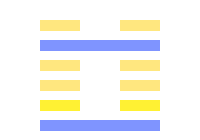
3.1.2.5 (3 > 7) - THE KUN HEXAGRAM
- 1. The first line, undivided, shows the difficulty (its subject has) in advancing. It will be advantageous for him to abide correct and firm; advantageous (also) to be made a feudal ruler.
- 2. The second line, divided, shows (its subject) distressed and obliged to return; (even) the horses of her chariot (also) seem to be retreating. (But) not by a spoiler (is she assailed), but by one who seeks her to be his wife. The young lady maintains her firm correctness, and declines a union. After ten years she will be united, and have children.
- 5. The fifth line, undivided, shows the difficulties in the way of (its subject's) dispensing the rich favours that might be expected from him. With firmness and correctness there will be good fortune in small things; (even) with them in great things there will be evil.
3.1.2.5 (3 > 7) - Listening to the good recommendations
One invests their business with the help of an experienced advisor.
Bing DeepL Google Yandex3.1.2.5 (3 > 7) - Listening to the good recommendations
One invests their business with the help of an experienced advisor.
Bing DeepL Google Yandex3.1.2.5 (3 > 7) - T’un, la difficulté initiale
T’un et tchun : A. 1. Bourgeon, pousse ; 2. Croissance, activité ; 3. Grandir, avancer. — B. Difficultés, arrêté dans son avancement, échec.
- 1. Pour s’établir solidement, il faut se maintenir en fermeté et droiture. (Pour maintenir le royaume), il est bon de constituer des chefs féodaux. Bien qu’on ait des difficultés, la volonté doit toujours s’attacher au devoir. Si, bien qu’élevé, on condescend aux besoins des petits, on s’attachera fortement le peuple.
-
2. 2a. Tchun est comme arrêté par les difficultés, comme un cavalier dont le cheval veut reculer (ou : un cheval monté qui veut...).
2b. C’est comme la jeune fille qui veut épouser un brigand ravisseur, elle doit rester inébranlable et attendre (plutôt) dix ans. (Malgré cela), elle pourra alors se marier et être mère. (Il est ici question de difficultés.)
Un équipage solide, l’enfantement après dix ans indique le retour à la prospérité, à l’avancement. -
5. Dans le développement de la sève des bourgeons, si elle se répand modérément, la croissance sera heureuse ; si elle se répand trop, le croissance sera empêchée.
Il en est ainsi si elle se répand avant d’être suffisamment riche et forte.
Obstacle au développement : s’il est petit, l’issue peut être heureuse ; s’il est grand, fin malheureuse.
3.1.2.5 (3 > 7) - Ecouter les bons conseils
On place ses affaires en s'aidant d'un conseiller expérimenté.
Bing DeepL Google Yandex3.1.2.5 (3 > 7) - Megoldás
- 1. Példamutató ha valaki mások segítségére siet a nehézségek ellenére.
- 2. Megbízható kapcsolatokat kell kialakítania mielőtt mások elfogadnák.
- 5. Tudni akar mielőtt döntene.

3.2.3.5 (3 > 11) - THE KUN HEXAGRAM
- 2. The second line, divided, shows (its subject) distressed and obliged to return; (even) the horses of her chariot (also) seem to be retreating. (But) not by a spoiler (is she assailed), but by one who seeks her to be his wife. The young lady maintains her firm correctness, and declines a union. After ten years she will be united, and have children.
- 3. The third line, divided, shows one following the deer without (the guidance of) the forester, and only finding himself in the midst of the forest. The superior man, acquainted with the secret risks, thinks it better to give up the chase. If he went forward, he would regret it.
- 5. The fifth line, undivided, shows the difficulties in the way of (its subject's) dispensing the rich favours that might be expected from him. With firmness and correctness there will be good fortune in small things; (even) with them in great things there will be evil.
3.2.3.5 (3 > 11) - Resolving difficulties
One is working to clarify a delicate situation.
Bing DeepL Google Yandex3.2.3.5 (3 > 11) - Resolving difficulties
One is working to clarify a delicate situation.
Bing DeepL Google Yandex3.2.3.5 (3 > 11) - T’un, la difficulté initiale
T’un et tchun : A. 1. Bourgeon, pousse ; 2. Croissance, activité ; 3. Grandir, avancer. — B. Difficultés, arrêté dans son avancement, échec.
-
2. 2a. Tchun est comme arrêté par les difficultés, comme un cavalier dont le cheval veut reculer (ou : un cheval monté qui veut...).
2b. C’est comme la jeune fille qui veut épouser un brigand ravisseur, elle doit rester inébranlable et attendre (plutôt) dix ans. (Malgré cela), elle pourra alors se marier et être mère. (Il est ici question de difficultés.)
Un équipage solide, l’enfantement après dix ans indique le retour à la prospérité, à l’avancement. -
3. Lorsque le gibier poursuivi s’enfonce inopinément dans une forêt profonde, le sage aime mieux l’abandonner que de s’exposer au danger. S’il l’y poursuit, il aura lieu de s’en repentir.
Il sera réduit à l’extrémité. -
5. Dans le développement de la sève des bourgeons, si elle se répand modérément, la croissance sera heureuse ; si elle se répand trop, le croissance sera empêchée.
Il en est ainsi si elle se répand avant d’être suffisamment riche et forte.
Obstacle au développement : s’il est petit, l’issue peut être heureuse ; s’il est grand, fin malheureuse.
3.2.3.5 (3 > 11) - Remédier aux difficultés
On travaille dans le but d'éclaircir une situation délicate.
Bing DeepL Google Yandex3.2.3.5 (3 > 11) - Megoldás
- 2. Megbízható kapcsolatokat kell kialakítania mielőtt mások elfogadnák.
- 3. Magányosan halad ismeretlen terepen. Vezetőt kell keresnie vagy visszafordulnia.
- 5. Tudni akar mielőtt döntene.
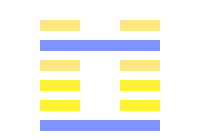
3.1.2.3.5 (3 > 46) - THE KUN HEXAGRAM
- 1. The first line, undivided, shows the difficulty (its subject has) in advancing. It will be advantageous for him to abide correct and firm; advantageous (also) to be made a feudal ruler.
- 2. The second line, divided, shows (its subject) distressed and obliged to return; (even) the horses of her chariot (also) seem to be retreating. (But) not by a spoiler (is she assailed), but by one who seeks her to be his wife. The young lady maintains her firm correctness, and declines a union. After ten years she will be united, and have children.
- 3. The third line, divided, shows one following the deer without (the guidance of) the forester, and only finding himself in the midst of the forest. The superior man, acquainted with the secret risks, thinks it better to give up the chase. If he went forward, he would regret it.
- 5. The fifth line, undivided, shows the difficulties in the way of (its subject's) dispensing the rich favours that might be expected from him. With firmness and correctness there will be good fortune in small things; (even) with them in great things there will be evil.
3.1.2.3.5 (3 > 46) - Knowing how to explain
One knows how to tell others what they have to carry out.
Bing DeepL Google Yandex3.1.2.3.5 (3 > 46) - Knowing how to explain
One knows how to tell others what they have to carry out.
Bing DeepL Google Yandex3.1.2.3.5 (3 > 46) - T’un, la difficulté initiale
T’un et tchun : A. 1. Bourgeon, pousse ; 2. Croissance, activité ; 3. Grandir, avancer. — B. Difficultés, arrêté dans son avancement, échec.
- 1. Pour s’établir solidement, il faut se maintenir en fermeté et droiture. (Pour maintenir le royaume), il est bon de constituer des chefs féodaux. Bien qu’on ait des difficultés, la volonté doit toujours s’attacher au devoir. Si, bien qu’élevé, on condescend aux besoins des petits, on s’attachera fortement le peuple.
-
2. 2a. Tchun est comme arrêté par les difficultés, comme un cavalier dont le cheval veut reculer (ou : un cheval monté qui veut...).
2b. C’est comme la jeune fille qui veut épouser un brigand ravisseur, elle doit rester inébranlable et attendre (plutôt) dix ans. (Malgré cela), elle pourra alors se marier et être mère. (Il est ici question de difficultés.)
Un équipage solide, l’enfantement après dix ans indique le retour à la prospérité, à l’avancement. -
3. Lorsque le gibier poursuivi s’enfonce inopinément dans une forêt profonde, le sage aime mieux l’abandonner que de s’exposer au danger. S’il l’y poursuit, il aura lieu de s’en repentir.
Il sera réduit à l’extrémité. -
5. Dans le développement de la sève des bourgeons, si elle se répand modérément, la croissance sera heureuse ; si elle se répand trop, le croissance sera empêchée.
Il en est ainsi si elle se répand avant d’être suffisamment riche et forte.
Obstacle au développement : s’il est petit, l’issue peut être heureuse ; s’il est grand, fin malheureuse.
3.1.2.3.5 (3 > 46) - Savoir expliquer
On sait comment faire pour dire aux autres ce qu'ils ont à accomplir.
Bing DeepL Google Yandex3.1.2.3.5 (3 > 46) - Megoldás
- 1. Példamutató ha valaki mások segítségére siet a nehézségek ellenére.
- 2. Megbízható kapcsolatokat kell kialakítania mielőtt mások elfogadnák.
- 3. Magányosan halad ismeretlen terepen. Vezetőt kell keresnie vagy visszafordulnia.
- 5. Tudni akar mielőtt döntene.

3.2.4.5 (3 > 54) - THE KUN HEXAGRAM
- 2. The second line, divided, shows (its subject) distressed and obliged to return; (even) the horses of her chariot (also) seem to be retreating. (But) not by a spoiler (is she assailed), but by one who seeks her to be his wife. The young lady maintains her firm correctness, and declines a union. After ten years she will be united, and have children.
- 4. The fourth line, divided, shows (its subject as a lady), the horses of whose chariot appear in retreat. She seeks, however, (the help of) him who seeks her to be his wife. Advance will be fortunate; all will turn out advantageously.
- 5. The fifth line, undivided, shows the difficulties in the way of (its subject's) dispensing the rich favours that might be expected from him. With firmness and correctness there will be good fortune in small things; (even) with them in great things there will be evil.
3.2.4.5 (3 > 54) - Resolving difficulties
One receives an action plan that will have unforeseen consequences.
Bing DeepL Google Yandex3.2.4.5 (3 > 54) - Resolving difficulties
One receives an action plan that will have unforeseen consequences.
Bing DeepL Google Yandex3.2.4.5 (3 > 54) - T’un, la difficulté initiale
T’un et tchun : A. 1. Bourgeon, pousse ; 2. Croissance, activité ; 3. Grandir, avancer. — B. Difficultés, arrêté dans son avancement, échec.
-
2. 2a. Tchun est comme arrêté par les difficultés, comme un cavalier dont le cheval veut reculer (ou : un cheval monté qui veut...).
2b. C’est comme la jeune fille qui veut épouser un brigand ravisseur, elle doit rester inébranlable et attendre (plutôt) dix ans. (Malgré cela), elle pourra alors se marier et être mère. (Il est ici question de difficultés.)
Un équipage solide, l’enfantement après dix ans indique le retour à la prospérité, à l’avancement. -
4. Si elle est demandée en mariage selon les rites, qu’elle y aille et ce sera bien. Cela lui sera avantageux.
Il en est de même de l’équipage arrêté qui reprend sa course. -
5. Dans le développement de la sève des bourgeons, si elle se répand modérément, la croissance sera heureuse ; si elle se répand trop, le croissance sera empêchée.
Il en est ainsi si elle se répand avant d’être suffisamment riche et forte.
Obstacle au développement : s’il est petit, l’issue peut être heureuse ; s’il est grand, fin malheureuse.
3.2.4.5 (3 > 54) - Remédier aux difficultés
On reçoit un plan d'action qui aura des conséquences imprévues.
Bing DeepL Google Yandex3.2.4.5 (3 > 54) - Megoldás
- 2. Megbízható kapcsolatokat kell kialakítania mielőtt mások elfogadnák.
- 4. Segítséget kap ha kivárja a sorát.
- 5. Tudni akar mielőtt döntene.
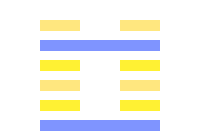
3.1.2.4.5 (3 > 40) - THE KUN HEXAGRAM
- 1. The first line, undivided, shows the difficulty (its subject has) in advancing. It will be advantageous for him to abide correct and firm; advantageous (also) to be made a feudal ruler.
- 2. The second line, divided, shows (its subject) distressed and obliged to return; (even) the horses of her chariot (also) seem to be retreating. (But) not by a spoiler (is she assailed), but by one who seeks her to be his wife. The young lady maintains her firm correctness, and declines a union. After ten years she will be united, and have children.
- 4. The fourth line, divided, shows (its subject as a lady), the horses of whose chariot appear in retreat. She seeks, however, (the help of) him who seeks her to be his wife. Advance will be fortunate; all will turn out advantageously.
- 5. The fifth line, undivided, shows the difficulties in the way of (its subject's) dispensing the rich favours that might be expected from him. With firmness and correctness there will be good fortune in small things; (even) with them in great things there will be evil.
3.1.2.4.5 (3 > 40) - Taking care of the weak first
One gives priority to the most needy.
Bing DeepL Google Yandex3.1.2.4.5 (3 > 40) - Taking care of the weak first
One gives priority to the most needy.
Bing DeepL Google Yandex3.1.2.4.5 (3 > 40) - T’un, la difficulté initiale
T’un et tchun : A. 1. Bourgeon, pousse ; 2. Croissance, activité ; 3. Grandir, avancer. — B. Difficultés, arrêté dans son avancement, échec.
- 1. Pour s’établir solidement, il faut se maintenir en fermeté et droiture. (Pour maintenir le royaume), il est bon de constituer des chefs féodaux. Bien qu’on ait des difficultés, la volonté doit toujours s’attacher au devoir. Si, bien qu’élevé, on condescend aux besoins des petits, on s’attachera fortement le peuple.
-
2. 2a. Tchun est comme arrêté par les difficultés, comme un cavalier dont le cheval veut reculer (ou : un cheval monté qui veut...).
2b. C’est comme la jeune fille qui veut épouser un brigand ravisseur, elle doit rester inébranlable et attendre (plutôt) dix ans. (Malgré cela), elle pourra alors se marier et être mère. (Il est ici question de difficultés.)
Un équipage solide, l’enfantement après dix ans indique le retour à la prospérité, à l’avancement. -
4. Si elle est demandée en mariage selon les rites, qu’elle y aille et ce sera bien. Cela lui sera avantageux.
Il en est de même de l’équipage arrêté qui reprend sa course. -
5. Dans le développement de la sève des bourgeons, si elle se répand modérément, la croissance sera heureuse ; si elle se répand trop, le croissance sera empêchée.
Il en est ainsi si elle se répand avant d’être suffisamment riche et forte.
Obstacle au développement : s’il est petit, l’issue peut être heureuse ; s’il est grand, fin malheureuse.
3.1.2.4.5 (3 > 40) - S'occuper d'abord des faibles
On place en priorité les plus nécessiteux.
Bing DeepL Google Yandex3.1.2.4.5 (3 > 40) - Megoldás
- 1. Példamutató ha valaki mások segítségére siet a nehézségek ellenére.
- 2. Megbízható kapcsolatokat kell kialakítania mielőtt mások elfogadnák.
- 4. Segítséget kap ha kivárja a sorát.
- 5. Tudni akar mielőtt döntene.

3.2.3.4.5 (3 > 34) - THE KUN HEXAGRAM
- 2. The second line, divided, shows (its subject) distressed and obliged to return; (even) the horses of her chariot (also) seem to be retreating. (But) not by a spoiler (is she assailed), but by one who seeks her to be his wife. The young lady maintains her firm correctness, and declines a union. After ten years she will be united, and have children.
- 3. The third line, divided, shows one following the deer without (the guidance of) the forester, and only finding himself in the midst of the forest. The superior man, acquainted with the secret risks, thinks it better to give up the chase. If he went forward, he would regret it.
- 4. The fourth line, divided, shows (its subject as a lady), the horses of whose chariot appear in retreat. She seeks, however, (the help of) him who seeks her to be his wife. Advance will be fortunate; all will turn out advantageously.
- 5. The fifth line, undivided, shows the difficulties in the way of (its subject's) dispensing the rich favours that might be expected from him. With firmness and correctness there will be good fortune in small things; (even) with them in great things there will be evil.
3.2.3.4.5 (3 > 34) - Resolving difficulties
One acts as if others did not hear.
Bing DeepL Google Yandex3.2.3.4.5 (3 > 34) - Resolving difficulties
One acts as if others did not hear.
Bing DeepL Google Yandex3.2.3.4.5 (3 > 34) - T’un, la difficulté initiale
T’un et tchun : A. 1. Bourgeon, pousse ; 2. Croissance, activité ; 3. Grandir, avancer. — B. Difficultés, arrêté dans son avancement, échec.
-
2. 2a. Tchun est comme arrêté par les difficultés, comme un cavalier dont le cheval veut reculer (ou : un cheval monté qui veut...).
2b. C’est comme la jeune fille qui veut épouser un brigand ravisseur, elle doit rester inébranlable et attendre (plutôt) dix ans. (Malgré cela), elle pourra alors se marier et être mère. (Il est ici question de difficultés.)
Un équipage solide, l’enfantement après dix ans indique le retour à la prospérité, à l’avancement. -
3. Lorsque le gibier poursuivi s’enfonce inopinément dans une forêt profonde, le sage aime mieux l’abandonner que de s’exposer au danger. S’il l’y poursuit, il aura lieu de s’en repentir.
Il sera réduit à l’extrémité. -
4. Si elle est demandée en mariage selon les rites, qu’elle y aille et ce sera bien. Cela lui sera avantageux.
Il en est de même de l’équipage arrêté qui reprend sa course. -
5. Dans le développement de la sève des bourgeons, si elle se répand modérément, la croissance sera heureuse ; si elle se répand trop, le croissance sera empêchée.
Il en est ainsi si elle se répand avant d’être suffisamment riche et forte.
Obstacle au développement : s’il est petit, l’issue peut être heureuse ; s’il est grand, fin malheureuse.
3.2.3.4.5 (3 > 34) - Remédier aux difficultés
On fait comme si les autres n'avaient pas entendu.
Bing DeepL Google Yandex3.2.3.4.5 (3 > 34) - Megoldás
- 2. Megbízható kapcsolatokat kell kialakítania mielőtt mások elfogadnák.
- 3. Magányosan halad ismeretlen terepen. Vezetőt kell keresnie vagy visszafordulnia.
- 4. Segítséget kap ha kivárja a sorát.
- 5. Tudni akar mielőtt döntene.
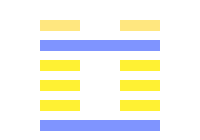
3.1.2.3.4.5 (3 > 32) - THE KUN HEXAGRAM
- 1. The first line, undivided, shows the difficulty (its subject has) in advancing. It will be advantageous for him to abide correct and firm; advantageous (also) to be made a feudal ruler.
- 2. The second line, divided, shows (its subject) distressed and obliged to return; (even) the horses of her chariot (also) seem to be retreating. (But) not by a spoiler (is she assailed), but by one who seeks her to be his wife. The young lady maintains her firm correctness, and declines a union. After ten years she will be united, and have children.
- 3. The third line, divided, shows one following the deer without (the guidance of) the forester, and only finding himself in the midst of the forest. The superior man, acquainted with the secret risks, thinks it better to give up the chase. If he went forward, he would regret it.
- 4. The fourth line, divided, shows (its subject as a lady), the horses of whose chariot appear in retreat. She seeks, however, (the help of) him who seeks her to be his wife. Advance will be fortunate; all will turn out advantageously.
- 5. The fifth line, undivided, shows the difficulties in the way of (its subject's) dispensing the rich favours that might be expected from him. With firmness and correctness there will be good fortune in small things; (even) with them in great things there will be evil.
3.1.2.3.4.5 (3 > 32) - To wait before declaring a winner
One wants to take their time before declaring that others have succeeded.
Bing DeepL Google Yandex3.1.2.3.4.5 (3 > 32) - To wait before declaring a winner
One wants to take their time before declaring that others have succeeded.
Bing DeepL Google Yandex3.1.2.3.4.5 (3 > 32) - T’un, la difficulté initiale
T’un et tchun : A. 1. Bourgeon, pousse ; 2. Croissance, activité ; 3. Grandir, avancer. — B. Difficultés, arrêté dans son avancement, échec.
- 1. Pour s’établir solidement, il faut se maintenir en fermeté et droiture. (Pour maintenir le royaume), il est bon de constituer des chefs féodaux. Bien qu’on ait des difficultés, la volonté doit toujours s’attacher au devoir. Si, bien qu’élevé, on condescend aux besoins des petits, on s’attachera fortement le peuple.
-
2. 2a. Tchun est comme arrêté par les difficultés, comme un cavalier dont le cheval veut reculer (ou : un cheval monté qui veut...).
2b. C’est comme la jeune fille qui veut épouser un brigand ravisseur, elle doit rester inébranlable et attendre (plutôt) dix ans. (Malgré cela), elle pourra alors se marier et être mère. (Il est ici question de difficultés.)
Un équipage solide, l’enfantement après dix ans indique le retour à la prospérité, à l’avancement. -
3. Lorsque le gibier poursuivi s’enfonce inopinément dans une forêt profonde, le sage aime mieux l’abandonner que de s’exposer au danger. S’il l’y poursuit, il aura lieu de s’en repentir.
Il sera réduit à l’extrémité. -
4. Si elle est demandée en mariage selon les rites, qu’elle y aille et ce sera bien. Cela lui sera avantageux.
Il en est de même de l’équipage arrêté qui reprend sa course. -
5. Dans le développement de la sève des bourgeons, si elle se répand modérément, la croissance sera heureuse ; si elle se répand trop, le croissance sera empêchée.
Il en est ainsi si elle se répand avant d’être suffisamment riche et forte.
Obstacle au développement : s’il est petit, l’issue peut être heureuse ; s’il est grand, fin malheureuse.
3.1.2.3.4.5 (3 > 32) - Attendre avant de déclarer un vainqueur
On veut prendre son temps avant de déclarer que les autres ont réussi.
Bing DeepL Google Yandex3.1.2.3.4.5 (3 > 32) - Megoldás
- 1. Példamutató ha valaki mások segítségére siet a nehézségek ellenére.
- 2. Megbízható kapcsolatokat kell kialakítania mielőtt mások elfogadnák.
- 3. Magányosan halad ismeretlen terepen. Vezetőt kell keresnie vagy visszafordulnia.
- 4. Segítséget kap ha kivárja a sorát.
- 5. Tudni akar mielőtt döntene.

3.2.6 (3 > 61) - THE KUN HEXAGRAM
- 2. The second line, divided, shows (its subject) distressed and obliged to return; (even) the horses of her chariot (also) seem to be retreating. (But) not by a spoiler (is she assailed), but by one who seeks her to be his wife. The young lady maintains her firm correctness, and declines a union. After ten years she will be united, and have children.
- 6. The topmost line, divided, shows (its subject) with the horses of his chariot obliged to retreat, and weeping tears of blood in streams.
3.2.6 (3 > 61) - Seeing one's former companions again
One seizes the opportunity to be with those they prefer.
Bing DeepL Google Yandex3.2.6 (3 > 61) - Seeing one's former companions again
One seizes the opportunity to be with those they prefer.
Bing DeepL Google Yandex3.2.6 (3 > 61) - T’un, la difficulté initiale
T’un et tchun : A. 1. Bourgeon, pousse ; 2. Croissance, activité ; 3. Grandir, avancer. — B. Difficultés, arrêté dans son avancement, échec.
-
2. 2a. Tchun est comme arrêté par les difficultés, comme un cavalier dont le cheval veut reculer (ou : un cheval monté qui veut...).
2b. C’est comme la jeune fille qui veut épouser un brigand ravisseur, elle doit rester inébranlable et attendre (plutôt) dix ans. (Malgré cela), elle pourra alors se marier et être mère. (Il est ici question de difficultés.)
Un équipage solide, l’enfantement après dix ans indique le retour à la prospérité, à l’avancement. - 6. L’avancement, arrêté comme un cheval monté qui recule, fait répandre des larmes amères et abondantes.
3.2.6 (3 > 61) - Revoir ses anciens compagnons
On saisit sa chance pour être avec ceux que l'on préfère.
Bing DeepL Google Yandex3.2.6 (3 > 61) - Megoldás
- 2. Megbízható kapcsolatokat kell kialakítania mielőtt mások elfogadnák.
- 6. Egyedül folytatja tovább mert mások biztosítékokat akarnak mielőtt támogatnák a fejlesztéseket. Tétotvázás helyett meg kell változtatnia szomszédságát hogy túlléphessen a nehézségeken.

3.1.2.6 (3 > 59) - THE KUN HEXAGRAM
- 1. The first line, undivided, shows the difficulty (its subject has) in advancing. It will be advantageous for him to abide correct and firm; advantageous (also) to be made a feudal ruler.
- 2. The second line, divided, shows (its subject) distressed and obliged to return; (even) the horses of her chariot (also) seem to be retreating. (But) not by a spoiler (is she assailed), but by one who seeks her to be his wife. The young lady maintains her firm correctness, and declines a union. After ten years she will be united, and have children.
- 6. The topmost line, divided, shows (its subject) with the horses of his chariot obliged to retreat, and weeping tears of blood in streams.
3.1.2.6 (3 > 59) - Resolving difficulties
One anticipates violations of the expected conditions so they trust those who can adapt to them.
Bing DeepL Google Yandex3.1.2.6 (3 > 59) - Resolving difficulties
One anticipates violations of the expected conditions so they trust those who can adapt to them.
Bing DeepL Google Yandex3.1.2.6 (3 > 59) - T’un, la difficulté initiale
T’un et tchun : A. 1. Bourgeon, pousse ; 2. Croissance, activité ; 3. Grandir, avancer. — B. Difficultés, arrêté dans son avancement, échec.
- 1. Pour s’établir solidement, il faut se maintenir en fermeté et droiture. (Pour maintenir le royaume), il est bon de constituer des chefs féodaux. Bien qu’on ait des difficultés, la volonté doit toujours s’attacher au devoir. Si, bien qu’élevé, on condescend aux besoins des petits, on s’attachera fortement le peuple.
-
2. 2a. Tchun est comme arrêté par les difficultés, comme un cavalier dont le cheval veut reculer (ou : un cheval monté qui veut...).
2b. C’est comme la jeune fille qui veut épouser un brigand ravisseur, elle doit rester inébranlable et attendre (plutôt) dix ans. (Malgré cela), elle pourra alors se marier et être mère. (Il est ici question de difficultés.)
Un équipage solide, l’enfantement après dix ans indique le retour à la prospérité, à l’avancement. - 6. L’avancement, arrêté comme un cheval monté qui recule, fait répandre des larmes amères et abondantes.
3.1.2.6 (3 > 59) - Remédier aux difficultés
On prévoit des atteintes aux conditions prévues alors on se fie à ceux qui peuvent s'y adapter.
Bing DeepL Google Yandex3.1.2.6 (3 > 59) - Megoldás
- 1. Példamutató ha valaki mások segítségére siet a nehézségek ellenére.
- 2. Megbízható kapcsolatokat kell kialakítania mielőtt mások elfogadnák.
- 6. Egyedül folytatja tovább mert mások biztosítékokat akarnak mielőtt támogatnák a fejlesztéseket. Tétotvázás helyett meg kell változtatnia szomszédságát hogy túlléphessen a nehézségeken.

3.2.3.6 (3 > 9) - THE KUN HEXAGRAM
- 2. The second line, divided, shows (its subject) distressed and obliged to return; (even) the horses of her chariot (also) seem to be retreating. (But) not by a spoiler (is she assailed), but by one who seeks her to be his wife. The young lady maintains her firm correctness, and declines a union. After ten years she will be united, and have children.
- 3. The third line, divided, shows one following the deer without (the guidance of) the forester, and only finding himself in the midst of the forest. The superior man, acquainted with the secret risks, thinks it better to give up the chase. If he went forward, he would regret it.
- 6. The topmost line, divided, shows (its subject) with the horses of his chariot obliged to retreat, and weeping tears of blood in streams.
3.2.3.6 (3 > 9) - Resolving difficulties
One does the impossible to satisfy others.
Bing DeepL Google Yandex3.2.3.6 (3 > 9) - Resolving difficulties
One does the impossible to satisfy others.
Bing DeepL Google Yandex3.2.3.6 (3 > 9) - T’un, la difficulté initiale
T’un et tchun : A. 1. Bourgeon, pousse ; 2. Croissance, activité ; 3. Grandir, avancer. — B. Difficultés, arrêté dans son avancement, échec.
-
2. 2a. Tchun est comme arrêté par les difficultés, comme un cavalier dont le cheval veut reculer (ou : un cheval monté qui veut...).
2b. C’est comme la jeune fille qui veut épouser un brigand ravisseur, elle doit rester inébranlable et attendre (plutôt) dix ans. (Malgré cela), elle pourra alors se marier et être mère. (Il est ici question de difficultés.)
Un équipage solide, l’enfantement après dix ans indique le retour à la prospérité, à l’avancement. -
3. Lorsque le gibier poursuivi s’enfonce inopinément dans une forêt profonde, le sage aime mieux l’abandonner que de s’exposer au danger. S’il l’y poursuit, il aura lieu de s’en repentir.
Il sera réduit à l’extrémité. - 6. L’avancement, arrêté comme un cheval monté qui recule, fait répandre des larmes amères et abondantes.
3.2.3.6 (3 > 9) - Remédier aux difficultés
On fait l'impossible pour que les autres soient satisfaits.
Bing DeepL Google Yandex3.2.3.6 (3 > 9) - Megoldás
- 2. Megbízható kapcsolatokat kell kialakítania mielőtt mások elfogadnák.
- 3. Magányosan halad ismeretlen terepen. Vezetőt kell keresnie vagy visszafordulnia.
- 6. Egyedül folytatja tovább mert mások biztosítékokat akarnak mielőtt támogatnák a fejlesztéseket. Tétotvázás helyett meg kell változtatnia szomszédságát hogy túlléphessen a nehézségeken.

3.1.2.3.6 (3 > 57) - THE KUN HEXAGRAM
- 1. The first line, undivided, shows the difficulty (its subject has) in advancing. It will be advantageous for him to abide correct and firm; advantageous (also) to be made a feudal ruler.
- 2. The second line, divided, shows (its subject) distressed and obliged to return; (even) the horses of her chariot (also) seem to be retreating. (But) not by a spoiler (is she assailed), but by one who seeks her to be his wife. The young lady maintains her firm correctness, and declines a union. After ten years she will be united, and have children.
- 3. The third line, divided, shows one following the deer without (the guidance of) the forester, and only finding himself in the midst of the forest. The superior man, acquainted with the secret risks, thinks it better to give up the chase. If he went forward, he would regret it.
- 6. The topmost line, divided, shows (its subject) with the horses of his chariot obliged to retreat, and weeping tears of blood in streams.
3.1.2.3.6 (3 > 57) - Resolving difficulties
One is doing things that others have not deemed necessary.
Bing DeepL Google Yandex3.1.2.3.6 (3 > 57) - Resolving difficulties
One is doing things that others have not deemed necessary.
Bing DeepL Google Yandex3.1.2.3.6 (3 > 57) - T’un, la difficulté initiale
T’un et tchun : A. 1. Bourgeon, pousse ; 2. Croissance, activité ; 3. Grandir, avancer. — B. Difficultés, arrêté dans son avancement, échec.
- 1. Pour s’établir solidement, il faut se maintenir en fermeté et droiture. (Pour maintenir le royaume), il est bon de constituer des chefs féodaux. Bien qu’on ait des difficultés, la volonté doit toujours s’attacher au devoir. Si, bien qu’élevé, on condescend aux besoins des petits, on s’attachera fortement le peuple.
-
2. 2a. Tchun est comme arrêté par les difficultés, comme un cavalier dont le cheval veut reculer (ou : un cheval monté qui veut...).
2b. C’est comme la jeune fille qui veut épouser un brigand ravisseur, elle doit rester inébranlable et attendre (plutôt) dix ans. (Malgré cela), elle pourra alors se marier et être mère. (Il est ici question de difficultés.)
Un équipage solide, l’enfantement après dix ans indique le retour à la prospérité, à l’avancement. -
3. Lorsque le gibier poursuivi s’enfonce inopinément dans une forêt profonde, le sage aime mieux l’abandonner que de s’exposer au danger. S’il l’y poursuit, il aura lieu de s’en repentir.
Il sera réduit à l’extrémité. - 6. L’avancement, arrêté comme un cheval monté qui recule, fait répandre des larmes amères et abondantes.
3.1.2.3.6 (3 > 57) - Remédier aux difficultés
On fait des choses que les autres n'ont pas estimées nécessaires.
Bing DeepL Google Yandex3.1.2.3.6 (3 > 57) - Megoldás
- 1. Példamutató ha valaki mások segítségére siet a nehézségek ellenére.
- 2. Megbízható kapcsolatokat kell kialakítania mielőtt mások elfogadnák.
- 3. Magányosan halad ismeretlen terepen. Vezetőt kell keresnie vagy visszafordulnia.
- 6. Egyedül folytatja tovább mert mások biztosítékokat akarnak mielőtt támogatnák a fejlesztéseket. Tétotvázás helyett meg kell változtatnia szomszédságát hogy túlléphessen a nehézségeken.

3.2.4.6 (3 > 10) - THE KUN HEXAGRAM
- 2. The second line, divided, shows (its subject) distressed and obliged to return; (even) the horses of her chariot (also) seem to be retreating. (But) not by a spoiler (is she assailed), but by one who seeks her to be his wife. The young lady maintains her firm correctness, and declines a union. After ten years she will be united, and have children.
- 4. The fourth line, divided, shows (its subject as a lady), the horses of whose chariot appear in retreat. She seeks, however, (the help of) him who seeks her to be his wife. Advance will be fortunate; all will turn out advantageously.
- 6. The topmost line, divided, shows (its subject) with the horses of his chariot obliged to retreat, and weeping tears of blood in streams.
3.2.4.6 (3 > 10) - Resolving difficulties
One asks others to be silent when they talk.
Bing DeepL Google Yandex3.2.4.6 (3 > 10) - Resolving difficulties
One asks others to be silent when they talk.
Bing DeepL Google Yandex3.2.4.6 (3 > 10) - T’un, la difficulté initiale
T’un et tchun : A. 1. Bourgeon, pousse ; 2. Croissance, activité ; 3. Grandir, avancer. — B. Difficultés, arrêté dans son avancement, échec.
-
2. 2a. Tchun est comme arrêté par les difficultés, comme un cavalier dont le cheval veut reculer (ou : un cheval monté qui veut...).
2b. C’est comme la jeune fille qui veut épouser un brigand ravisseur, elle doit rester inébranlable et attendre (plutôt) dix ans. (Malgré cela), elle pourra alors se marier et être mère. (Il est ici question de difficultés.)
Un équipage solide, l’enfantement après dix ans indique le retour à la prospérité, à l’avancement. -
4. Si elle est demandée en mariage selon les rites, qu’elle y aille et ce sera bien. Cela lui sera avantageux.
Il en est de même de l’équipage arrêté qui reprend sa course. - 6. L’avancement, arrêté comme un cheval monté qui recule, fait répandre des larmes amères et abondantes.
3.2.4.6 (3 > 10) - Remédier aux difficultés
On demande aux autres de se taire quand on parle.
Bing DeepL Google Yandex3.2.4.6 (3 > 10) - Megoldás
- 2. Megbízható kapcsolatokat kell kialakítania mielőtt mások elfogadnák.
- 4. Segítséget kap ha kivárja a sorát.
- 6. Egyedül folytatja tovább mert mások biztosítékokat akarnak mielőtt támogatnák a fejlesztéseket. Tétotvázás helyett meg kell változtatnia szomszédságát hogy túlléphessen a nehézségeken.

3.1.2.4.6 (3 > 6) - THE KUN HEXAGRAM
- 1. The first line, undivided, shows the difficulty (its subject has) in advancing. It will be advantageous for him to abide correct and firm; advantageous (also) to be made a feudal ruler.
- 2. The second line, divided, shows (its subject) distressed and obliged to return; (even) the horses of her chariot (also) seem to be retreating. (But) not by a spoiler (is she assailed), but by one who seeks her to be his wife. The young lady maintains her firm correctness, and declines a union. After ten years she will be united, and have children.
- 4. The fourth line, divided, shows (its subject as a lady), the horses of whose chariot appear in retreat. She seeks, however, (the help of) him who seeks her to be his wife. Advance will be fortunate; all will turn out advantageously.
- 6. The topmost line, divided, shows (its subject) with the horses of his chariot obliged to retreat, and weeping tears of blood in streams.
3.1.2.4.6 (3 > 6) - Recalling the victories of the past
One continues, remembering that others have already succeeded.
Bing DeepL Google Yandex3.1.2.4.6 (3 > 6) - Recalling the victories of the past
One continues, remembering that others have already succeeded.
Bing DeepL Google Yandex3.1.2.4.6 (3 > 6) - T’un, la difficulté initiale
T’un et tchun : A. 1. Bourgeon, pousse ; 2. Croissance, activité ; 3. Grandir, avancer. — B. Difficultés, arrêté dans son avancement, échec.
- 1. Pour s’établir solidement, il faut se maintenir en fermeté et droiture. (Pour maintenir le royaume), il est bon de constituer des chefs féodaux. Bien qu’on ait des difficultés, la volonté doit toujours s’attacher au devoir. Si, bien qu’élevé, on condescend aux besoins des petits, on s’attachera fortement le peuple.
-
2. 2a. Tchun est comme arrêté par les difficultés, comme un cavalier dont le cheval veut reculer (ou : un cheval monté qui veut...).
2b. C’est comme la jeune fille qui veut épouser un brigand ravisseur, elle doit rester inébranlable et attendre (plutôt) dix ans. (Malgré cela), elle pourra alors se marier et être mère. (Il est ici question de difficultés.)
Un équipage solide, l’enfantement après dix ans indique le retour à la prospérité, à l’avancement. -
4. Si elle est demandée en mariage selon les rites, qu’elle y aille et ce sera bien. Cela lui sera avantageux.
Il en est de même de l’équipage arrêté qui reprend sa course. - 6. L’avancement, arrêté comme un cheval monté qui recule, fait répandre des larmes amères et abondantes.
3.1.2.4.6 (3 > 6) - Se rappeler les victoires du passé
On continue en se souvenant que les autres y sont déjà parvenus.
Bing DeepL Google Yandex3.1.2.4.6 (3 > 6) - Megoldás
- 1. Példamutató ha valaki mások segítségére siet a nehézségek ellenére.
- 2. Megbízható kapcsolatokat kell kialakítania mielőtt mások elfogadnák.
- 4. Segítséget kap ha kivárja a sorát.
- 6. Egyedül folytatja tovább mert mások biztosítékokat akarnak mielőtt támogatnák a fejlesztéseket. Tétotvázás helyett meg kell változtatnia szomszédságát hogy túlléphessen a nehézségeken.

3.2.3.4.6 (3 > 1) - THE KUN HEXAGRAM
- 2. The second line, divided, shows (its subject) distressed and obliged to return; (even) the horses of her chariot (also) seem to be retreating. (But) not by a spoiler (is she assailed), but by one who seeks her to be his wife. The young lady maintains her firm correctness, and declines a union. After ten years she will be united, and have children.
- 3. The third line, divided, shows one following the deer without (the guidance of) the forester, and only finding himself in the midst of the forest. The superior man, acquainted with the secret risks, thinks it better to give up the chase. If he went forward, he would regret it.
- 4. The fourth line, divided, shows (its subject as a lady), the horses of whose chariot appear in retreat. She seeks, however, (the help of) him who seeks her to be his wife. Advance will be fortunate; all will turn out advantageously.
- 6. The topmost line, divided, shows (its subject) with the horses of his chariot obliged to retreat, and weeping tears of blood in streams.
3.2.3.4.6 (3 > 1) - Overcoming one's fears
One needs to question the others before they can free oneself from their anxieties.
Bing DeepL Google Yandex3.2.3.4.6 (3 > 1) - Overcoming one's fears
One needs to question the others before they can free oneself from their anxieties.
Bing DeepL Google Yandex3.2.3.4.6 (3 > 1) - T’un, la difficulté initiale
T’un et tchun : A. 1. Bourgeon, pousse ; 2. Croissance, activité ; 3. Grandir, avancer. — B. Difficultés, arrêté dans son avancement, échec.
-
2. 2a. Tchun est comme arrêté par les difficultés, comme un cavalier dont le cheval veut reculer (ou : un cheval monté qui veut...).
2b. C’est comme la jeune fille qui veut épouser un brigand ravisseur, elle doit rester inébranlable et attendre (plutôt) dix ans. (Malgré cela), elle pourra alors se marier et être mère. (Il est ici question de difficultés.)
Un équipage solide, l’enfantement après dix ans indique le retour à la prospérité, à l’avancement. -
3. Lorsque le gibier poursuivi s’enfonce inopinément dans une forêt profonde, le sage aime mieux l’abandonner que de s’exposer au danger. S’il l’y poursuit, il aura lieu de s’en repentir.
Il sera réduit à l’extrémité. -
4. Si elle est demandée en mariage selon les rites, qu’elle y aille et ce sera bien. Cela lui sera avantageux.
Il en est de même de l’équipage arrêté qui reprend sa course. - 6. L’avancement, arrêté comme un cheval monté qui recule, fait répandre des larmes amères et abondantes.
3.2.3.4.6 (3 > 1) - Surmonter ses craintes
On doit interroger les autres avant de pouvoir se libérer de ses angoisses.
Bing DeepL Google Yandex3.2.3.4.6 (3 > 1) - Megoldás
- 2. Megbízható kapcsolatokat kell kialakítania mielőtt mások elfogadnák.
- 3. Magányosan halad ismeretlen terepen. Vezetőt kell keresnie vagy visszafordulnia.
- 4. Segítséget kap ha kivárja a sorát.
- 6. Egyedül folytatja tovább mert mások biztosítékokat akarnak mielőtt támogatnák a fejlesztéseket. Tétotvázás helyett meg kell változtatnia szomszédságát hogy túlléphessen a nehézségeken.

3.1.2.3.4.6 (3 > 44) - THE KUN HEXAGRAM
- 1. The first line, undivided, shows the difficulty (its subject has) in advancing. It will be advantageous for him to abide correct and firm; advantageous (also) to be made a feudal ruler.
- 2. The second line, divided, shows (its subject) distressed and obliged to return; (even) the horses of her chariot (also) seem to be retreating. (But) not by a spoiler (is she assailed), but by one who seeks her to be his wife. The young lady maintains her firm correctness, and declines a union. After ten years she will be united, and have children.
- 3. The third line, divided, shows one following the deer without (the guidance of) the forester, and only finding himself in the midst of the forest. The superior man, acquainted with the secret risks, thinks it better to give up the chase. If he went forward, he would regret it.
- 4. The fourth line, divided, shows (its subject as a lady), the horses of whose chariot appear in retreat. She seeks, however, (the help of) him who seeks her to be his wife. Advance will be fortunate; all will turn out advantageously.
- 6. The topmost line, divided, shows (its subject) with the horses of his chariot obliged to retreat, and weeping tears of blood in streams.
3.1.2.3.4.6 (3 > 44) - Resolving difficulties
One becomes a schemer to indulge their most guilty instincts.
Bing DeepL Google Yandex3.1.2.3.4.6 (3 > 44) - Resolving difficulties
One becomes a schemer to indulge their most guilty instincts.
Bing DeepL Google Yandex3.1.2.3.4.6 (3 > 44) - T’un, la difficulté initiale
T’un et tchun : A. 1. Bourgeon, pousse ; 2. Croissance, activité ; 3. Grandir, avancer. — B. Difficultés, arrêté dans son avancement, échec.
- 1. Pour s’établir solidement, il faut se maintenir en fermeté et droiture. (Pour maintenir le royaume), il est bon de constituer des chefs féodaux. Bien qu’on ait des difficultés, la volonté doit toujours s’attacher au devoir. Si, bien qu’élevé, on condescend aux besoins des petits, on s’attachera fortement le peuple.
-
2. 2a. Tchun est comme arrêté par les difficultés, comme un cavalier dont le cheval veut reculer (ou : un cheval monté qui veut...).
2b. C’est comme la jeune fille qui veut épouser un brigand ravisseur, elle doit rester inébranlable et attendre (plutôt) dix ans. (Malgré cela), elle pourra alors se marier et être mère. (Il est ici question de difficultés.)
Un équipage solide, l’enfantement après dix ans indique le retour à la prospérité, à l’avancement. -
3. Lorsque le gibier poursuivi s’enfonce inopinément dans une forêt profonde, le sage aime mieux l’abandonner que de s’exposer au danger. S’il l’y poursuit, il aura lieu de s’en repentir.
Il sera réduit à l’extrémité. -
4. Si elle est demandée en mariage selon les rites, qu’elle y aille et ce sera bien. Cela lui sera avantageux.
Il en est de même de l’équipage arrêté qui reprend sa course. - 6. L’avancement, arrêté comme un cheval monté qui recule, fait répandre des larmes amères et abondantes.
3.1.2.3.4.6 (3 > 44) - Remédier aux difficultés
On devient intriguant pour satisfaire ses instincts les plus coupables.
Bing DeepL Google Yandex3.1.2.3.4.6 (3 > 44) - Megoldás
- 1. Példamutató ha valaki mások segítségére siet a nehézségek ellenére.
- 2. Megbízható kapcsolatokat kell kialakítania mielőtt mások elfogadnák.
- 3. Magányosan halad ismeretlen terepen. Vezetőt kell keresnie vagy visszafordulnia.
- 4. Segítséget kap ha kivárja a sorát.
- 6. Egyedül folytatja tovább mert mások biztosítékokat akarnak mielőtt támogatnák a fejlesztéseket. Tétotvázás helyett meg kell változtatnia szomszédságát hogy túlléphessen a nehézségeken.

3.2.5.6 (3 > 41) - THE KUN HEXAGRAM
- 2. The second line, divided, shows (its subject) distressed and obliged to return; (even) the horses of her chariot (also) seem to be retreating. (But) not by a spoiler (is she assailed), but by one who seeks her to be his wife. The young lady maintains her firm correctness, and declines a union. After ten years she will be united, and have children.
- 5. The fifth line, undivided, shows the difficulties in the way of (its subject's) dispensing the rich favours that might be expected from him. With firmness and correctness there will be good fortune in small things; (even) with them in great things there will be evil.
- 6. The topmost line, divided, shows (its subject) with the horses of his chariot obliged to retreat, and weeping tears of blood in streams.
3.2.5.6 (3 > 41) - Relaxing before having fun
One does their best when they have little time for their hobbies.
Bing DeepL Google Yandex3.2.5.6 (3 > 41) - Relaxing before having fun
One does their best when they have little time for their hobbies.
Bing DeepL Google Yandex3.2.5.6 (3 > 41) - T’un, la difficulté initiale
T’un et tchun : A. 1. Bourgeon, pousse ; 2. Croissance, activité ; 3. Grandir, avancer. — B. Difficultés, arrêté dans son avancement, échec.
-
2. 2a. Tchun est comme arrêté par les difficultés, comme un cavalier dont le cheval veut reculer (ou : un cheval monté qui veut...).
2b. C’est comme la jeune fille qui veut épouser un brigand ravisseur, elle doit rester inébranlable et attendre (plutôt) dix ans. (Malgré cela), elle pourra alors se marier et être mère. (Il est ici question de difficultés.)
Un équipage solide, l’enfantement après dix ans indique le retour à la prospérité, à l’avancement. -
5. Dans le développement de la sève des bourgeons, si elle se répand modérément, la croissance sera heureuse ; si elle se répand trop, le croissance sera empêchée.
Il en est ainsi si elle se répand avant d’être suffisamment riche et forte.
Obstacle au développement : s’il est petit, l’issue peut être heureuse ; s’il est grand, fin malheureuse. - 6. L’avancement, arrêté comme un cheval monté qui recule, fait répandre des larmes amères et abondantes.
3.2.5.6 (3 > 41) - Se reposer avant de se distraire
On fait de son mieux quand on a peu de temps à consacrer à ses loisirs.
Bing DeepL Google Yandex3.2.5.6 (3 > 41) - Megoldás
- 2. Megbízható kapcsolatokat kell kialakítania mielőtt mások elfogadnák.
- 5. Tudni akar mielőtt döntene.
- 6. Egyedül folytatja tovább mert mások biztosítékokat akarnak mielőtt támogatnák a fejlesztéseket. Tétotvázás helyett meg kell változtatnia szomszédságát hogy túlléphessen a nehézségeken.
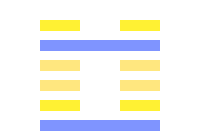
3.1.2.5.6 (3 > 4) - THE KUN HEXAGRAM
- 1. The first line, undivided, shows the difficulty (its subject has) in advancing. It will be advantageous for him to abide correct and firm; advantageous (also) to be made a feudal ruler.
- 2. The second line, divided, shows (its subject) distressed and obliged to return; (even) the horses of her chariot (also) seem to be retreating. (But) not by a spoiler (is she assailed), but by one who seeks her to be his wife. The young lady maintains her firm correctness, and declines a union. After ten years she will be united, and have children.
- 5. The fifth line, undivided, shows the difficulties in the way of (its subject's) dispensing the rich favours that might be expected from him. With firmness and correctness there will be good fortune in small things; (even) with them in great things there will be evil.
- 6. The topmost line, divided, shows (its subject) with the horses of his chariot obliged to retreat, and weeping tears of blood in streams.
3.1.2.5.6 (3 > 4) - Resolving difficulties
One prepares their shot well before the others are aware.
Bing DeepL Google Yandex3.1.2.5.6 (3 > 4) - Resolving difficulties
One prepares their shot well before the others are aware.
Bing DeepL Google Yandex3.1.2.5.6 (3 > 4) - T’un, la difficulté initiale
T’un et tchun : A. 1. Bourgeon, pousse ; 2. Croissance, activité ; 3. Grandir, avancer. — B. Difficultés, arrêté dans son avancement, échec.
- 1. Pour s’établir solidement, il faut se maintenir en fermeté et droiture. (Pour maintenir le royaume), il est bon de constituer des chefs féodaux. Bien qu’on ait des difficultés, la volonté doit toujours s’attacher au devoir. Si, bien qu’élevé, on condescend aux besoins des petits, on s’attachera fortement le peuple.
-
2. 2a. Tchun est comme arrêté par les difficultés, comme un cavalier dont le cheval veut reculer (ou : un cheval monté qui veut...).
2b. C’est comme la jeune fille qui veut épouser un brigand ravisseur, elle doit rester inébranlable et attendre (plutôt) dix ans. (Malgré cela), elle pourra alors se marier et être mère. (Il est ici question de difficultés.)
Un équipage solide, l’enfantement après dix ans indique le retour à la prospérité, à l’avancement. -
5. Dans le développement de la sève des bourgeons, si elle se répand modérément, la croissance sera heureuse ; si elle se répand trop, le croissance sera empêchée.
Il en est ainsi si elle se répand avant d’être suffisamment riche et forte.
Obstacle au développement : s’il est petit, l’issue peut être heureuse ; s’il est grand, fin malheureuse. - 6. L’avancement, arrêté comme un cheval monté qui recule, fait répandre des larmes amères et abondantes.
3.1.2.5.6 (3 > 4) - Remédier aux difficultés
On prépare son coup bien avant que les autres ne soient au courant.
Bing DeepL Google Yandex3.1.2.5.6 (3 > 4) - Megoldás
- 1. Példamutató ha valaki mások segítségére siet a nehézségek ellenére.
- 2. Megbízható kapcsolatokat kell kialakítania mielőtt mások elfogadnák.
- 5. Tudni akar mielőtt döntene.
- 6. Egyedül folytatja tovább mert mások biztosítékokat akarnak mielőtt támogatnák a fejlesztéseket. Tétotvázás helyett meg kell változtatnia szomszédságát hogy túlléphessen a nehézségeken.

3.2.3.5.6 (3 > 26) - THE KUN HEXAGRAM
- 2. The second line, divided, shows (its subject) distressed and obliged to return; (even) the horses of her chariot (also) seem to be retreating. (But) not by a spoiler (is she assailed), but by one who seeks her to be his wife. The young lady maintains her firm correctness, and declines a union. After ten years she will be united, and have children.
- 3. The third line, divided, shows one following the deer without (the guidance of) the forester, and only finding himself in the midst of the forest. The superior man, acquainted with the secret risks, thinks it better to give up the chase. If he went forward, he would regret it.
- 5. The fifth line, undivided, shows the difficulties in the way of (its subject's) dispensing the rich favours that might be expected from him. With firmness and correctness there will be good fortune in small things; (even) with them in great things there will be evil.
- 6. The topmost line, divided, shows (its subject) with the horses of his chariot obliged to retreat, and weeping tears of blood in streams.
3.2.3.5.6 (3 > 26) - Containing hesitations
One tempers others so as to prevent them from moving forward hesitantly.
Bing DeepL Google Yandex3.2.3.5.6 (3 > 26) - Containing hesitations
One tempers others so as to prevent them from moving forward hesitantly.
Bing DeepL Google Yandex3.2.3.5.6 (3 > 26) - T’un, la difficulté initiale
T’un et tchun : A. 1. Bourgeon, pousse ; 2. Croissance, activité ; 3. Grandir, avancer. — B. Difficultés, arrêté dans son avancement, échec.
-
2. 2a. Tchun est comme arrêté par les difficultés, comme un cavalier dont le cheval veut reculer (ou : un cheval monté qui veut...).
2b. C’est comme la jeune fille qui veut épouser un brigand ravisseur, elle doit rester inébranlable et attendre (plutôt) dix ans. (Malgré cela), elle pourra alors se marier et être mère. (Il est ici question de difficultés.)
Un équipage solide, l’enfantement après dix ans indique le retour à la prospérité, à l’avancement. -
3. Lorsque le gibier poursuivi s’enfonce inopinément dans une forêt profonde, le sage aime mieux l’abandonner que de s’exposer au danger. S’il l’y poursuit, il aura lieu de s’en repentir.
Il sera réduit à l’extrémité. -
5. Dans le développement de la sève des bourgeons, si elle se répand modérément, la croissance sera heureuse ; si elle se répand trop, le croissance sera empêchée.
Il en est ainsi si elle se répand avant d’être suffisamment riche et forte.
Obstacle au développement : s’il est petit, l’issue peut être heureuse ; s’il est grand, fin malheureuse. - 6. L’avancement, arrêté comme un cheval monté qui recule, fait répandre des larmes amères et abondantes.
3.2.3.5.6 (3 > 26) - Contenir les hésitations
On freine les autres pour les empêcher d'avancer en hésitant.
Bing DeepL Google Yandex3.2.3.5.6 (3 > 26) - Megoldás
- 2. Megbízható kapcsolatokat kell kialakítania mielőtt mások elfogadnák.
- 3. Magányosan halad ismeretlen terepen. Vezetőt kell keresnie vagy visszafordulnia.
- 5. Tudni akar mielőtt döntene.
- 6. Egyedül folytatja tovább mert mások biztosítékokat akarnak mielőtt támogatnák a fejlesztéseket. Tétotvázás helyett meg kell változtatnia szomszédságát hogy túlléphessen a nehézségeken.
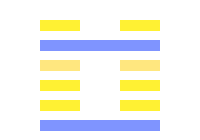
3.1.2.3.5.6 (3 > 18) - THE KUN HEXAGRAM
- 1. The first line, undivided, shows the difficulty (its subject has) in advancing. It will be advantageous for him to abide correct and firm; advantageous (also) to be made a feudal ruler.
- 2. The second line, divided, shows (its subject) distressed and obliged to return; (even) the horses of her chariot (also) seem to be retreating. (But) not by a spoiler (is she assailed), but by one who seeks her to be his wife. The young lady maintains her firm correctness, and declines a union. After ten years she will be united, and have children.
- 3. The third line, divided, shows one following the deer without (the guidance of) the forester, and only finding himself in the midst of the forest. The superior man, acquainted with the secret risks, thinks it better to give up the chase. If he went forward, he would regret it.
- 5. The fifth line, undivided, shows the difficulties in the way of (its subject's) dispensing the rich favours that might be expected from him. With firmness and correctness there will be good fortune in small things; (even) with them in great things there will be evil.
- 6. The topmost line, divided, shows (its subject) with the horses of his chariot obliged to retreat, and weeping tears of blood in streams.
3.1.2.3.5.6 (3 > 18) - Resolving difficulties
One believes oneself above others when they should highlight them.
Bing DeepL Google Yandex3.1.2.3.5.6 (3 > 18) - Resolving difficulties
One believes oneself above others when they should highlight them.
Bing DeepL Google Yandex3.1.2.3.5.6 (3 > 18) - T’un, la difficulté initiale
T’un et tchun : A. 1. Bourgeon, pousse ; 2. Croissance, activité ; 3. Grandir, avancer. — B. Difficultés, arrêté dans son avancement, échec.
- 1. Pour s’établir solidement, il faut se maintenir en fermeté et droiture. (Pour maintenir le royaume), il est bon de constituer des chefs féodaux. Bien qu’on ait des difficultés, la volonté doit toujours s’attacher au devoir. Si, bien qu’élevé, on condescend aux besoins des petits, on s’attachera fortement le peuple.
-
2. 2a. Tchun est comme arrêté par les difficultés, comme un cavalier dont le cheval veut reculer (ou : un cheval monté qui veut...).
2b. C’est comme la jeune fille qui veut épouser un brigand ravisseur, elle doit rester inébranlable et attendre (plutôt) dix ans. (Malgré cela), elle pourra alors se marier et être mère. (Il est ici question de difficultés.)
Un équipage solide, l’enfantement après dix ans indique le retour à la prospérité, à l’avancement. -
3. Lorsque le gibier poursuivi s’enfonce inopinément dans une forêt profonde, le sage aime mieux l’abandonner que de s’exposer au danger. S’il l’y poursuit, il aura lieu de s’en repentir.
Il sera réduit à l’extrémité. -
5. Dans le développement de la sève des bourgeons, si elle se répand modérément, la croissance sera heureuse ; si elle se répand trop, le croissance sera empêchée.
Il en est ainsi si elle se répand avant d’être suffisamment riche et forte.
Obstacle au développement : s’il est petit, l’issue peut être heureuse ; s’il est grand, fin malheureuse. - 6. L’avancement, arrêté comme un cheval monté qui recule, fait répandre des larmes amères et abondantes.
3.1.2.3.5.6 (3 > 18) - Remédier aux difficultés
On se croit au-dessus des autres alors qu'on devrait les mettre en valeur.
Bing DeepL Google Yandex3.1.2.3.5.6 (3 > 18) - Megoldás
- 1. Példamutató ha valaki mások segítségére siet a nehézségek ellenére.
- 2. Megbízható kapcsolatokat kell kialakítania mielőtt mások elfogadnák.
- 3. Magányosan halad ismeretlen terepen. Vezetőt kell keresnie vagy visszafordulnia.
- 5. Tudni akar mielőtt döntene.
- 6. Egyedül folytatja tovább mert mások biztosítékokat akarnak mielőtt támogatnák a fejlesztéseket. Tétotvázás helyett meg kell változtatnia szomszédságát hogy túlléphessen a nehézségeken.

3.2.4.5.6 (3 > 38) - THE KUN HEXAGRAM
- 2. The second line, divided, shows (its subject) distressed and obliged to return; (even) the horses of her chariot (also) seem to be retreating. (But) not by a spoiler (is she assailed), but by one who seeks her to be his wife. The young lady maintains her firm correctness, and declines a union. After ten years she will be united, and have children.
- 4. The fourth line, divided, shows (its subject as a lady), the horses of whose chariot appear in retreat. She seeks, however, (the help of) him who seeks her to be his wife. Advance will be fortunate; all will turn out advantageously.
- 5. The fifth line, undivided, shows the difficulties in the way of (its subject's) dispensing the rich favours that might be expected from him. With firmness and correctness there will be good fortune in small things; (even) with them in great things there will be evil.
- 6. The topmost line, divided, shows (its subject) with the horses of his chariot obliged to retreat, and weeping tears of blood in streams.
3.2.4.5.6 (3 > 38) - Learning to avoid traps
One notices dividing lines that do not allow them to go where they want.
Bing DeepL Google Yandex3.2.4.5.6 (3 > 38) - Learning to avoid traps
One notices dividing lines that do not allow them to go where they want.
Bing DeepL Google Yandex3.2.4.5.6 (3 > 38) - T’un, la difficulté initiale
T’un et tchun : A. 1. Bourgeon, pousse ; 2. Croissance, activité ; 3. Grandir, avancer. — B. Difficultés, arrêté dans son avancement, échec.
-
2. 2a. Tchun est comme arrêté par les difficultés, comme un cavalier dont le cheval veut reculer (ou : un cheval monté qui veut...).
2b. C’est comme la jeune fille qui veut épouser un brigand ravisseur, elle doit rester inébranlable et attendre (plutôt) dix ans. (Malgré cela), elle pourra alors se marier et être mère. (Il est ici question de difficultés.)
Un équipage solide, l’enfantement après dix ans indique le retour à la prospérité, à l’avancement. -
4. Si elle est demandée en mariage selon les rites, qu’elle y aille et ce sera bien. Cela lui sera avantageux.
Il en est de même de l’équipage arrêté qui reprend sa course. -
5. Dans le développement de la sève des bourgeons, si elle se répand modérément, la croissance sera heureuse ; si elle se répand trop, le croissance sera empêchée.
Il en est ainsi si elle se répand avant d’être suffisamment riche et forte.
Obstacle au développement : s’il est petit, l’issue peut être heureuse ; s’il est grand, fin malheureuse. - 6. L’avancement, arrêté comme un cheval monté qui recule, fait répandre des larmes amères et abondantes.
3.2.4.5.6 (3 > 38) - Apprendre à éviter les pièges
On remarque des lignes séparatrices qui ne permettent pas d'aller où on veut.
Bing DeepL Google Yandex3.2.4.5.6 (3 > 38) - Megoldás
- 2. Megbízható kapcsolatokat kell kialakítania mielőtt mások elfogadnák.
- 4. Segítséget kap ha kivárja a sorát.
- 5. Tudni akar mielőtt döntene.
- 6. Egyedül folytatja tovább mert mások biztosítékokat akarnak mielőtt támogatnák a fejlesztéseket. Tétotvázás helyett meg kell változtatnia szomszédságát hogy túlléphessen a nehézségeken.
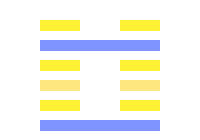
3.1.2.4.5.6 (3 > 64) - THE KUN HEXAGRAM
- 1. The first line, undivided, shows the difficulty (its subject has) in advancing. It will be advantageous for him to abide correct and firm; advantageous (also) to be made a feudal ruler.
- 2. The second line, divided, shows (its subject) distressed and obliged to return; (even) the horses of her chariot (also) seem to be retreating. (But) not by a spoiler (is she assailed), but by one who seeks her to be his wife. The young lady maintains her firm correctness, and declines a union. After ten years she will be united, and have children.
- 4. The fourth line, divided, shows (its subject as a lady), the horses of whose chariot appear in retreat. She seeks, however, (the help of) him who seeks her to be his wife. Advance will be fortunate; all will turn out advantageously.
- 5. The fifth line, undivided, shows the difficulties in the way of (its subject's) dispensing the rich favours that might be expected from him. With firmness and correctness there will be good fortune in small things; (even) with them in great things there will be evil.
- 6. The topmost line, divided, shows (its subject) with the horses of his chariot obliged to retreat, and weeping tears of blood in streams.
3.1.2.4.5.6 (3 > 64) - Resolving difficulties
One is regarded as being tender but they have some very clear-cut ideas in store.
Bing DeepL Google Yandex3.1.2.4.5.6 (3 > 64) - Resolving difficulties
One is regarded as being tender but they have some very clear-cut ideas in store.
Bing DeepL Google Yandex3.1.2.4.5.6 (3 > 64) - T’un, la difficulté initiale
T’un et tchun : A. 1. Bourgeon, pousse ; 2. Croissance, activité ; 3. Grandir, avancer. — B. Difficultés, arrêté dans son avancement, échec.
- 1. Pour s’établir solidement, il faut se maintenir en fermeté et droiture. (Pour maintenir le royaume), il est bon de constituer des chefs féodaux. Bien qu’on ait des difficultés, la volonté doit toujours s’attacher au devoir. Si, bien qu’élevé, on condescend aux besoins des petits, on s’attachera fortement le peuple.
-
2. 2a. Tchun est comme arrêté par les difficultés, comme un cavalier dont le cheval veut reculer (ou : un cheval monté qui veut...).
2b. C’est comme la jeune fille qui veut épouser un brigand ravisseur, elle doit rester inébranlable et attendre (plutôt) dix ans. (Malgré cela), elle pourra alors se marier et être mère. (Il est ici question de difficultés.)
Un équipage solide, l’enfantement après dix ans indique le retour à la prospérité, à l’avancement. -
4. Si elle est demandée en mariage selon les rites, qu’elle y aille et ce sera bien. Cela lui sera avantageux.
Il en est de même de l’équipage arrêté qui reprend sa course. -
5. Dans le développement de la sève des bourgeons, si elle se répand modérément, la croissance sera heureuse ; si elle se répand trop, le croissance sera empêchée.
Il en est ainsi si elle se répand avant d’être suffisamment riche et forte.
Obstacle au développement : s’il est petit, l’issue peut être heureuse ; s’il est grand, fin malheureuse. - 6. L’avancement, arrêté comme un cheval monté qui recule, fait répandre des larmes amères et abondantes.
3.1.2.4.5.6 (3 > 64) - Remédier aux difficultés
On passe pour être un tendre mais on a en réserve des idées bien tranchées.
Bing DeepL Google Yandex3.1.2.4.5.6 (3 > 64) - Megoldás
- 1. Példamutató ha valaki mások segítségére siet a nehézségek ellenére.
- 2. Megbízható kapcsolatokat kell kialakítania mielőtt mások elfogadnák.
- 4. Segítséget kap ha kivárja a sorát.
- 5. Tudni akar mielőtt döntene.
- 6. Egyedül folytatja tovább mert mások biztosítékokat akarnak mielőtt támogatnák a fejlesztéseket. Tétotvázás helyett meg kell változtatnia szomszédságát hogy túlléphessen a nehézségeken.

3.2.3.4.5.6 (3 > 14) - THE KUN HEXAGRAM
- 2. The second line, divided, shows (its subject) distressed and obliged to return; (even) the horses of her chariot (also) seem to be retreating. (But) not by a spoiler (is she assailed), but by one who seeks her to be his wife. The young lady maintains her firm correctness, and declines a union. After ten years she will be united, and have children.
- 3. The third line, divided, shows one following the deer without (the guidance of) the forester, and only finding himself in the midst of the forest. The superior man, acquainted with the secret risks, thinks it better to give up the chase. If he went forward, he would regret it.
- 4. The fourth line, divided, shows (its subject as a lady), the horses of whose chariot appear in retreat. She seeks, however, (the help of) him who seeks her to be his wife. Advance will be fortunate; all will turn out advantageously.
- 5. The fifth line, undivided, shows the difficulties in the way of (its subject's) dispensing the rich favours that might be expected from him. With firmness and correctness there will be good fortune in small things; (even) with them in great things there will be evil.
- 6. The topmost line, divided, shows (its subject) with the horses of his chariot obliged to retreat, and weeping tears of blood in streams.
3.2.3.4.5.6 (3 > 14) - Resolving difficulties
One spends time with those who could help them.
Bing DeepL Google Yandex3.2.3.4.5.6 (3 > 14) - Resolving difficulties
One spends time with those who could help them.
Bing DeepL Google Yandex3.2.3.4.5.6 (3 > 14) - T’un, la difficulté initiale
T’un et tchun : A. 1. Bourgeon, pousse ; 2. Croissance, activité ; 3. Grandir, avancer. — B. Difficultés, arrêté dans son avancement, échec.
-
2. 2a. Tchun est comme arrêté par les difficultés, comme un cavalier dont le cheval veut reculer (ou : un cheval monté qui veut...).
2b. C’est comme la jeune fille qui veut épouser un brigand ravisseur, elle doit rester inébranlable et attendre (plutôt) dix ans. (Malgré cela), elle pourra alors se marier et être mère. (Il est ici question de difficultés.)
Un équipage solide, l’enfantement après dix ans indique le retour à la prospérité, à l’avancement. -
3. Lorsque le gibier poursuivi s’enfonce inopinément dans une forêt profonde, le sage aime mieux l’abandonner que de s’exposer au danger. S’il l’y poursuit, il aura lieu de s’en repentir.
Il sera réduit à l’extrémité. -
4. Si elle est demandée en mariage selon les rites, qu’elle y aille et ce sera bien. Cela lui sera avantageux.
Il en est de même de l’équipage arrêté qui reprend sa course. -
5. Dans le développement de la sève des bourgeons, si elle se répand modérément, la croissance sera heureuse ; si elle se répand trop, le croissance sera empêchée.
Il en est ainsi si elle se répand avant d’être suffisamment riche et forte.
Obstacle au développement : s’il est petit, l’issue peut être heureuse ; s’il est grand, fin malheureuse. - 6. L’avancement, arrêté comme un cheval monté qui recule, fait répandre des larmes amères et abondantes.
3.2.3.4.5.6 (3 > 14) - Remédier aux difficultés
On passe du temps avec ceux qui pourraient nous aider.
Bing DeepL Google Yandex3.2.3.4.5.6 (3 > 14) - Megoldás
- 2. Megbízható kapcsolatokat kell kialakítania mielőtt mások elfogadnák.
- 3. Magányosan halad ismeretlen terepen. Vezetőt kell keresnie vagy visszafordulnia.
- 4. Segítséget kap ha kivárja a sorát.
- 5. Tudni akar mielőtt döntene.
- 6. Egyedül folytatja tovább mert mások biztosítékokat akarnak mielőtt támogatnák a fejlesztéseket. Tétotvázás helyett meg kell változtatnia szomszédságát hogy túlléphessen a nehézségeken.
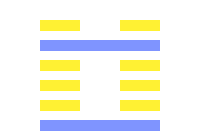
3.1.2.3.4.5.6 (3 > 50) - THE KUN HEXAGRAM
- 1. The first line, undivided, shows the difficulty (its subject has) in advancing. It will be advantageous for him to abide correct and firm; advantageous (also) to be made a feudal ruler.
- 2. The second line, divided, shows (its subject) distressed and obliged to return; (even) the horses of her chariot (also) seem to be retreating. (But) not by a spoiler (is she assailed), but by one who seeks her to be his wife. The young lady maintains her firm correctness, and declines a union. After ten years she will be united, and have children.
- 3. The third line, divided, shows one following the deer without (the guidance of) the forester, and only finding himself in the midst of the forest. The superior man, acquainted with the secret risks, thinks it better to give up the chase. If he went forward, he would regret it.
- 4. The fourth line, divided, shows (its subject as a lady), the horses of whose chariot appear in retreat. She seeks, however, (the help of) him who seeks her to be his wife. Advance will be fortunate; all will turn out advantageously.
- 5. The fifth line, undivided, shows the difficulties in the way of (its subject's) dispensing the rich favours that might be expected from him. With firmness and correctness there will be good fortune in small things; (even) with them in great things there will be evil.
- 6. The topmost line, divided, shows (its subject) with the horses of his chariot obliged to retreat, and weeping tears of blood in streams.
3.1.2.3.4.5.6 (3 > 50) - Resolving difficulties
Others want one to stand beside them.
Bing DeepL Google Yandex3.1.2.3.4.5.6 (3 > 50) - Resolving difficulties
Others want one to be involved with them.
Bing DeepL Google Yandex3.1.2.3.4.5.6 (3 > 50) - T’un, la difficulté initiale
T’un et tchun : A. 1. Bourgeon, pousse ; 2. Croissance, activité ; 3. Grandir, avancer. — B. Difficultés, arrêté dans son avancement, échec.
- 1. Pour s’établir solidement, il faut se maintenir en fermeté et droiture. (Pour maintenir le royaume), il est bon de constituer des chefs féodaux. Bien qu’on ait des difficultés, la volonté doit toujours s’attacher au devoir. Si, bien qu’élevé, on condescend aux besoins des petits, on s’attachera fortement le peuple.
-
2. 2a. Tchun est comme arrêté par les difficultés, comme un cavalier dont le cheval veut reculer (ou : un cheval monté qui veut...).
2b. C’est comme la jeune fille qui veut épouser un brigand ravisseur, elle doit rester inébranlable et attendre (plutôt) dix ans. (Malgré cela), elle pourra alors se marier et être mère. (Il est ici question de difficultés.)
Un équipage solide, l’enfantement après dix ans indique le retour à la prospérité, à l’avancement. -
3. Lorsque le gibier poursuivi s’enfonce inopinément dans une forêt profonde, le sage aime mieux l’abandonner que de s’exposer au danger. S’il l’y poursuit, il aura lieu de s’en repentir.
Il sera réduit à l’extrémité. -
4. Si elle est demandée en mariage selon les rites, qu’elle y aille et ce sera bien. Cela lui sera avantageux.
Il en est de même de l’équipage arrêté qui reprend sa course. -
5. Dans le développement de la sève des bourgeons, si elle se répand modérément, la croissance sera heureuse ; si elle se répand trop, le croissance sera empêchée.
Il en est ainsi si elle se répand avant d’être suffisamment riche et forte.
Obstacle au développement : s’il est petit, l’issue peut être heureuse ; s’il est grand, fin malheureuse. - 6. L’avancement, arrêté comme un cheval monté qui recule, fait répandre des larmes amères et abondantes.
3.1.2.3.4.5.6 (3 > 50) - Remédier aux difficultés
Les autres veulent que l'on s'engage à leur côté.
Bing DeepL Google Yandex3.1.2.3.4.5.6 (3 > 50) - Megoldás
- 1. Példamutató ha valaki mások segítségére siet a nehézségek ellenére.
- 2. Megbízható kapcsolatokat kell kialakítania mielőtt mások elfogadnák.
- 3. Magányosan halad ismeretlen terepen. Vezetőt kell keresnie vagy visszafordulnia.
- 4. Segítséget kap ha kivárja a sorát.
- 5. Tudni akar mielőtt döntene.
- 6. Egyedül folytatja tovább mert mások biztosítékokat akarnak mielőtt támogatnák a fejlesztéseket. Tétotvázás helyett meg kell változtatnia szomszédságát hogy túlléphessen a nehézségeken.

